Fundamentals of International Business
国际商务英语(英文版)

International Business English国际商务英语Lesson 1 International Business第一课国际商务*International business refers to transaction between parties from different countries. Sometimes business across the borders of different customs areas of the same country is also regarded as import and export, such as business between Hong Kong and Taiwan.*International business involves more factors and thus is more complicated than domestic business. The following are some major differences between the two.1). The countries involved often have different legal systems, and one or more parties will have to adjust themselves to operate in compliance with the foreign law.2). Different counties usually use different currencies and the parties concerned will have to decide which currency to use and do everything necessary as regards conversion etc. Uncertainties and even risks are often involved in the use of a foreign currency.3).Cultural differences including language, customs, traditions, religion, value, behaviour etc. often constitute challenges and even traps for people engaged in international business.4). Countries vary in natural and economic conditions and may have different policies towards foreign trade and investment, making international business more complex than domestic business.*With the development of economic globalisation, few people or companies can completely stay away from international business. Some knowledge in this respect is necessary both for the benefit of enterprises and personal advancement.*International business first took the form of commodity trade, i.e. exporting and importing goods produced or manufactured in one country for consumption or resale in another. This form of trade is also referred to as visible trade. Later a different kind of trade in the form of transportation, communication, banking, insurance, consulting, information etc. gradually became more and more important. This type of trade is called invisible trade. Today, the contribution of service industries of the developed countries constitutes over 60% of their gross domestic products and account for an increasing proportion of world trade. *Another important form of international business is supplying capital by residents of one country to another, known as international investments. Such investments can be classified into two categories. The first kindof investments, foreign direct investments or FDI for short is made for returns through controlling the enterprises or assets invested in in a host country.*The host country is a foreign country where the investor operates, while the country where the headquarters of the investor is located is called the home country. The second kind of investment, portfolio investment, refers to purchases of foreign financial assets for a purpose other than controlling. Such financial assets may be stocks, bonds or certificates of deposit.Stocks are also called capital stocks or bonds. Bonds are papers issued by a government or a firm with promise to pay back the money lent or invested together with interest. The maturity period of a bond is at least one year, often longer, for example five, or even ten years. Certificates of deposit generally involve large amounts, say 25 thousand US dollars *Besides trade and investment, international licensing and franchising are sometimes taken as a means of entering a foreign market. In licensing, a firm leases the right to use its intellectual property to a firm in another country. Such intellectual property may be trademarks, brand names, patents, copyrights or technology. Firms choose licensing because they do not have to make cash payments to start business, and can simply receive income in the form of royaltyBesides, they can benefit from locational advantages of foreign operation without any obligations in ownership or management. The use of licensing is particularly encouraged by high customs duty and non-tariff barriers on the part of the host country. However it is not advisable to use licensing in countries with weak intellectual property protection since the licensor may have difficulty in enforcing licensing agreement.*Franchising can be regarded as a special form of licensing. Under franchising, a firm, called the franchisee, is allowed to operate in the name of another, called the franchiser who provides the former with trademarks, brand names, logos, and operating techniques for royalty. In comparison with the relation between the licenser and the licensee, the franchiser has more control over and provides more support for the franchisee.*The franchiser can develop internationally and gain access to useful information about the local market with little risk and cost, and the franchisee can easily get into a business with established products or services. Franchising is fairly popular especially in hotel and restaurant business.*Other forms for participating in international business are management contract, contract manufacturing, and turnkey project.*Under a management contract, one company offers managerial or other specialized services to another within a particular period for a flat payment or a percentage of the relevant business volume. Sometimes bonusesbased on profitability or sales growth are also specified in management contracts.Government policies often have a lot to do with management contracts. When a government forbids foreign ownership in certain industries it considers to be of strategic importance but lacks the expertise for operation, management contracts may be a practical choice enabling a foreign company to operate in the industry without owning the assets*By contract manufacturing, a firm can concentrate on their strongest part in the value chain, e.g. marketing, while contracting with foreign companies for the manufacture of their products. Such firms can reduce the amount of their resources devoted to manufacture and benefit from location advantages from production in host countries. However, loss of control over the production process may give rise to problems in respect of quality and time of delivery.*For an international turnkey project, a firm signs a contract with a foreign purchaser and undertakes all the designing, contracting and facility equipping before handing it over to the latter upon completion. Such projects are often large and complex and take a long period to complete. Payment for a turnkey project may be made at fixed total price or on a cost plus basis. The latter way of payment shifts the burden of possible additional cost over the original budget onto the purchaser *BOT is a popular variant of the turnkey project where B stands for Build, O for operate and T for transfer. For a BOT project, a firm operate a facility for a period of time after building it up before finally transferring it to a foreign company. Making profit from operating the project for a period is the major difference between BOT and the common turnkey project. Needless to say, the contractor has to bear the financial and other risks that may occur in the period of operation.*Some Words and Expressionscustoms area 关税区in compliance with 遵从,遵照conversion n.货币兑换visible trade 有形贸易resale n.转售invisible trade 无形贸易gross domestic product 国内生产总值for short 缩写为account for 占……比例headquarters n.总部trap n.陷阱,圈套portfolio investment 证券投资stocks n.股票bonds n.债券maturity n.(票据等)到期,到期日certificate of deposit 大额存单other than 而不是licensing n.许可经营franchising n.特许经营n.商标advisable adj.可行的,适当的patent n.专利royalty n.专利使用费,许可使用费,版税copyright n.版权licensor n.给予许可的人licensee n.接受许可的人franchiser n.给予特许的人franchisee n.接受特许的人logo n.标识,标记management contract 管理合同expertise n.专门知识bonus n.红利,奖金,津贴flat adj.一律的,无变动的contract manufacturing 承包生产value chain 价值链turnkey project 交钥匙工程BOT(Build, Operate, Transfer)建设,经营,移交Stand for 表示,代表variant n.变形,变体Lesson twoIncome Level and the World Market第二课收入水平和世界市场This lesson discusses the relation between the income level and the market potential, and the features of high income, middle income and low income markets.Special analyses are made on Triad, i.e. the markets of North America,European Union and Japan, as well as other markets that are closely related with China.The first two paragraphs mainly deal with GNP and GDP, two important concepts usedto indicate the total size of an economy. GDP, Gross Domestic Product, stresses the place of production while GNP, Gross National Product, on the ownership of production factors.GDP is used by most countries now where as GNP was more popular before the 1990s. The actual figures of a country’s GNP and GDP are, however, quite similar in most cases and we can use whichever figure that is available.TEXT:In assessing the potential of a market, people often look at its income level since it provides clues about the purchasing power of its residents. The concepts national income and national product have roughly the same value and can be used interchangeably if our interest is in their sum total which is measured as the market value of the total output of goods and services of an economy in a given period, usually a year. The differenceis only in their emphasis. The former stresses the income generated by turning out the products while the latter, the value of the product s themselves. Gross National Product, GNP, and Gross Domestic Product, GDP, are two important concepts used to indicate a country’s total income. GNP refers to the market value of goods and services produced by the property and labor owned by the residents of an economy. This term was used by most governments before the 1990s国民生产总值(GNP)是最重要的宏观经济指标,它是指一个国家地区的国民经济在一定时期(一般1年)内以货币表现的全部最终产品(含货物和服务)价值的总和。
国际商务谈判Chapter1InternationalBusinessNegotiation.ppt

国际商务谈判
Chapter 1 Fundamentals of International Business Negotiating
第一章 国际商务谈判概述
• 1.1 Concepts and principles of negotiation
• As the stakes in some of these negotiations are not so high, people need not have to get preplans for the process and the outcome. There are other cases like international business negotiations in which the stakes are too high to be ignored, people have to be more cautious.
Characteristics of business negotiation
• Some of the characteristics of business negotiation include:
• ① Negotiation is at the heart of every transaction and, for the most part, it comes down to the interaction between two sides with a common goal (profits) but divergent methods.
• In negotiations, both parties should know: • a. why they negotiate • b. who they negotiate with • c. what they negotiate about • d. where they negotiate • e. when they negotiate • f. how they negotiate
《跨境电商基础(英)》-课程教学大纲
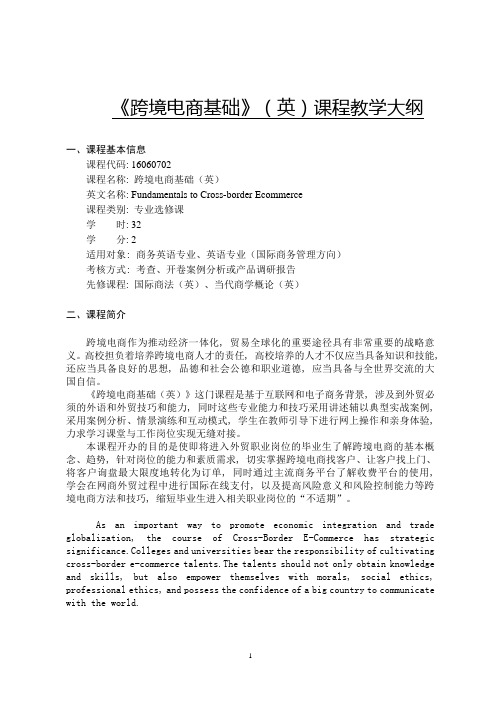
《跨境电商基础》(英)课程教学大纲一、课程基本信息课程代码: 16060702课程名称: 跨境电商基础(英)英文名称: Fundamentals to Cross-border Ecommerce课程类别: 专业选修课学时: 32学分: 2适用对象: 商务英语专业、英语专业(国际商务管理方向)考核方式: 考查、开卷案例分析或产品调研报告先修课程: 国际商法(英)、当代商学概论(英)二、课程简介跨境电商作为推动经济一体化, 贸易全球化的重要途径具有非常重要的战略意义。
高校担负着培养跨境电商人才的责任, 高校培养的人才不仅应当具备知识和技能, 还应当具备良好的思想, 品德和社会公德和职业道德, 应当具备与全世界交流的大国自信。
《跨境电商基础(英)》这门课程是基于互联网和电子商务背景, 涉及到外贸必须的外语和外贸技巧和能力, 同时这些专业能力和技巧采用讲述辅以典型实战案例, 采用案例分析、情景演练和互动模式, 学生在教师引导下进行网上操作和亲身体验, 力求学习课堂与工作岗位实现无缝对接。
本课程开办的目的是使即将进入外贸职业岗位的毕业生了解跨境电商的基本概念、趋势, 针对岗位的能力和素质需求, 切实掌握跨境电商找客户、让客户找上门、将客户询盘最大限度地转化为订单, 同时通过主流商务平台了解收费平台的使用, 学会在网商外贸过程中进行国际在线支付, 以及提高风险意义和风险控制能力等跨境电商方法和技巧, 缩短毕业生进入相关职业岗位的“不适期”。
As an important way to promote economic integration and trade globalization, the course of Cross-Border E-Commerce has strategic significance.Colleges and universities bear the responsibility of cultivating cross-border e-commerce talents.The talents should not only obtain knowledge and skills, but also empower themselves with morals, social ethics, professional ethics, and possess the confidence of a big country to communicate with the world.This course, Fundamentals to Cross-border Ecommerce (English) is based on the Internet and e-commerce background.It involves the foreign language and foreign trade skills and abilities necessary for foreign trade.At the same time, these professional abilities and skills are supplemented by typical practical cases and case studies.Situational exercises and interactive modes, students conduct online operations and personal experience under the guidance, and strive to achieve seamless integration between classrooms and future jobs.The purpose of this course is to enable the seniors who are about to enter foreign trade careers to understand the basic concepts and trends of cross-border e-commerce, to meet the ability and quality needs of the relative posts, to effectively grasp the concept and process of cross-border e-commerce to find customers actively, to be found by the potential business partners by some passive marketing, mainly via the mainstream cross-border electronic commercial platforms.Then to maximize the possibility to transform customers’inquiries and requirements into real orders is another vital concern.The use of toll platforms is understood through the mainstream business platform.International online payment is taught in the process of foreign trade of online merchants, and cross-border e-commerce methods and techniques such as improving risk significance and risk control capabilities are shortened.Graduates enter the “discomfort period”of relevant professional positions. Course assessment is based on the weighted average of class participation 40% and final term case analysis 60%.Marks for class participation will be determined by five parts --- students’in-class group presentation, group case discussion, and individual in-class question-answering, written assignment and class attendance.三、课程性质与教学目的《跨境电商基础(英)》是外国语学院为商务英语专业以及英语专业(国际商务管理方向)学生开设的专业选修课。
CommunicatinginInternationalBusiness国际商务函电

If you speak to Mr Wood about production,ask him to consider the delivery schedule.
2024/2/6
23
Correctness
As applied to a business message ,correctness means appropriate and grammatically correct language,factual information and accurate reliable figures.
B. To be familiar with the envelope formats of English business letters.
C. To be familiar with the basic principles for English business letter writing.
We won’t be able to send you the brochure this month.
We will send you the brochure next month.
2024/2/6
ห้องสมุดไป่ตู้
15
Example
We are shipping your order of September 21 this afternoon.
Fundamentals of Writing English Business Letters
2024/2/6
1
Learning Objectives
☆Knowledge objectives
A. To be familiar with the formats and the structures of English business letters
《商务英语口语》课件

03
Practical Application of Business English
Speaking
The Application of Business English Speaking in
Negotiations
Байду номын сангаас
Negotiation Preparation
Useful phrases and vocabulary for clarifying goals, researching opponents and understanding negotiation strategies
Presentations and Meetings
Preparing for speaking engagements, using visual aids and handling Q&A sessions effectively
Dealing with Emergencies
Phrases for handling unexpected situations, such as delays, cancellations and loss luggage, with professionalism and composition
Good Business English speaking skills can enhance career opportunities and promotions They are highly valued by employees and can lead to increased confidence and success in professional settings
体验商务英语3 unit1Globalization
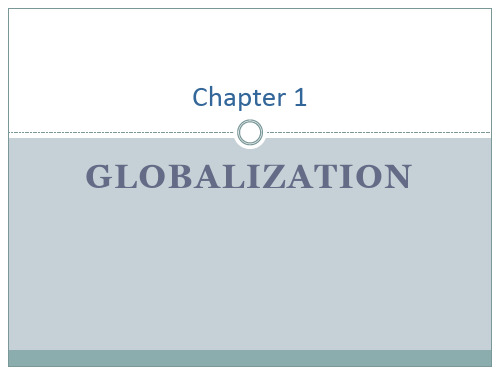
1. Converging tastes and preferences of consumers in different nations Q: Impacts on American businesses? 2. Examples of global brands: Coca Cola, Starbucks, Sony, and McDonald’s
1-13
The Role of Technological Change
The lowering of trade barriers made globalization
of markets and production a theoretical possibility, technological change made it a tangible reality Since World War II, there have been major advances in communication, information processing, and transportation1-4来自Introduction
The effects of this trend can be seen in the following Examples in our daily life: in the cars people drive in the food people eat in the jobs where people work in the clothes people wear in many other ways
1-6
The Globalization of Markets
The globalization of markets refers to the
《国际商法(英)》-课程教学大纲
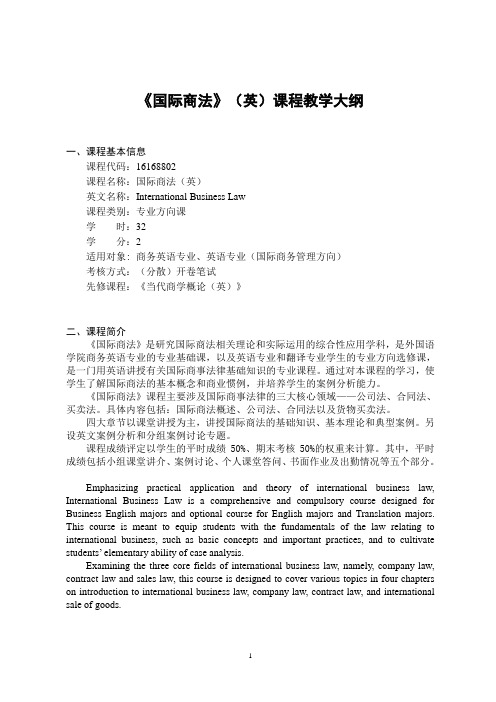
《国际商法》(英)课程教学大纲一、课程基本信息课程代码:16168802课程名称:国际商法(英)英文名称:International Business Law课程类别:专业方向课学时:32学分:2适用对象: 商务英语专业、英语专业(国际商务管理方向)考核方式:(分散)开卷笔试先修课程:《当代商学概论(英)》二、课程简介《国际商法》是研究国际商法相关理论和实际运用的综合性应用学科,是外国语学院商务英语专业的专业基础课,以及英语专业和翻译专业学生的专业方向选修课,是一门用英语讲授有关国际商事法律基础知识的专业课程。
通过对本课程的学习,使学生了解国际商法的基本概念和商业惯例,并培养学生的案例分析能力。
《国际商法》课程主要涉及国际商事法律的三大核心领域——公司法、合同法、买卖法。
具体内容包括:国际商法概述、公司法、合同法以及货物买卖法。
四大章节以课堂讲授为主,讲授国际商法的基础知识、基本理论和典型案例。
另设英文案例分析和分组案例讨论专题。
课程成绩评定以学生的平时成绩50%、期末考核50%的权重来计算。
其中,平时成绩包括小组课堂讲介、案例讨论、个人课堂答问、书面作业及出勤情况等五个部分。
Emphasizing practical application and theory of international business law, International Business Law is a comprehensive and compulsory course designed for Business English majors and optional course for English majors and Translation majors. This course is meant to equip students with the fundamentals of the law relating to international business, such as basic concepts and important practices, and to cultivate students’ elementary ability of case analysis.Examining the three core fields of international business law, namely, company law, contract law and sales law, this course is designed to cover various topics in four chapters on introduction to international business law, company law, contract law, and international sale of goods.Lectures will be focused on legal concepts, important doctrines and typical cases. Some cases will be assigned to students for after-class reading and then in-class discussion. And some special lectures will be devoted to case analysis and in-class case discussion on a group basis.Course assessment is based on the weighted average of class participation 50% and final term case analysis 50%. Marks for class participation consist of five parts --- determined respectively by students’ in-class group presentation, group case discussion, and individual in-class question-answering, written assignments and class attendance.三、课程性质与教学目的《国际商法》是外国语学院为商务英语专业以及英语专业和翻译专业高年级学生开设的专业基础拓展课。
新编剑桥商务英语unit-9

To establish and maintain business relationships, promote cooperation, resolve business issues and disputes, and enhance corporate image and brand value.
Psychological tactics and case analysis in business negotiations
• The application of psychological tactics: In business negotiations, the use of psychological tactics has a significant impact on the negotiation results. By understanding the other party's psychology, creating a tense atmosphere, and giving a deadline, one can create psychological pressure on the other party and make decisions that are beneficial to oneself.
• Expanding International Perspective: By learning and mastering Business English, learners can gain a deeper understanding of international business rules and cultural differences, broaden their international perspective, and improve their cross-cultural communication skills.
2014级商务导论lesson 1 International Business

(1) Preferential duties (优惠关税) Duty applied to importing goods according to its geographical source; a country that is given preferential treatment pays a lower tariff.
Acombination of duty placed on imported items, the amount of which is based on the above two duties.
E.g. 10% of the value + $1 per battery
If there is a shipment of 100 batteries valued at $2000
6. Forms of International Operation Agents Licensing/Franchising Outsourcing Branch Offices Direct investment
Global Business
7. Special Issues
Social & Cultural Differences Foreign Exchange Trade Barriers Tariffs Non-Tariff Barriers
① Circulation of goods, capital, services, employees & technology ② Importing & exporting ③ Cross-border transaction in IPR by licensing & franchising ④ Financing
国际商法专业词汇中英文对照表
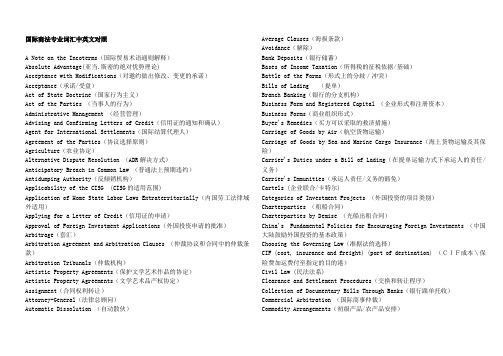
国际商法专业词汇中英文对照A Note on the Incoterms(国际贸易术语通则解释)Absolute Advantage(亚当.斯密的绝对优势理论)Acceptance with Modifications(对邀约做出修改、变更的承诺)Acceptance(承诺/受盘)Act of State Doctrine(国家行为主义)Act of the Parties (当事人的行为)Administrative Management (经营管理)Advising and Confirming Letters of Credit(信用证的通知和确认)Agent for International Settlements(国际结算代理人)Agreement of the Parties(协议选择原则)Agriculture(农业协定)Alternative Dispute Resolution (ADR解决方式)Anticipatory Breach in Common Law (普通法上预期违约)Antidumping Authority(反倾销机构)Applicability of the CISG (CISG的适用范围)Application of Home State Labor Laws Extraterritorially(内国劳工法律域外适用)Applying for a Letter of Credit(信用证的申请)Approval of Foreign Investment Applications(外国投资申请的批准)Arbitrage(套汇)Arbitration Agreement and Arbitration Clauses (仲裁协议和合同中的仲裁条款)Arbitration Tribunals(仲裁机构)Artistic Property Agreements(保护文学艺术作品的协定)Artistic Property Agreements(文学艺术品产权协定)Assignment(合同权利转让)Attorney-General(法律总顾问)Automatic Dissolution (自动散伙)Average Clauses(海损条款)Avoidance(解除)Bank Deposits(银行储蓄)Bases of Income Taxation(所得税的征税依据/基础)Battle of the Forms(形式上的分歧/冲突)Bills of Lading (提单)Branch Banking(银行的分支机构)Business Form and Registered Capital (企业形式和注册资本)Business Forms(商业组织形式)Buyer's Remedies(买方可以采取的救济措施)Carriage of Goods by Air(航空货物运输)Carriage of Goods by Sea and Marine Cargo Insurance(海上货物运输及其保险)Carrier's Duties under a Bill of Lading(在提单运输方式下承运人的责任/义务)Carrier's Immunities(承运人责任/义务的豁免)Cartels (企业联合/卡特尔)Categories of Investment Projects (外国投资的项目类别)Charterparties (租船合同)Charterparties by Demise (光船出租合同)China's Fundamental Policies for Encouraging Foreign Investments (中国大陆鼓励外国投资的基本政策)Choosing the Governing Law(准据法的选择)CIF (cost, insurance and freight) (port of destination) (CIF成本\保险费加运费付至指定的目的港)Civil Law (民法法系)Clearance and Settlement Procedures(交换和转让程序)Collection of Documentary Bills Through Banks(银行跟单托收)Commercial Arbitration (国际商事仲裁)Commodity Arrangements(初级产品/农产品安排)Common Enterprise Liability(企业的一般责任)Common Law (普通法系)Common Procedures in Handling Bills of Exchange (汇票处理的一般程序)Common Stock (股票)Company Taxpayers(公司/法人企业纳税人)Comparative Advantage(大卫.李嘉图的比较优势理论)Comparison of Municipal Legal Systems(内国法系的比较研究) Compensation for Winding up (清算补偿)Comprehensive Agreements (综合性的协定)Compulsory Licenses(强制许可)Computation of Income(收入计算)Conformity of Goods(与合同约定相符合的货物)Consent to the Jurisdiction of the Host State(给予东道国管辖权的许可/同意)Consideration in Common Law(英美法上的对价)Contemporary International Trade Law(当代国际贸易法)Contract Law for the International Sale of Goods(国际货物销售合同法)Contract Liability of the Agent (代理人的合同义务)Contract Liability of the Principal (委托人的合同义务)Contractual Issues Excluded from the Coverage of CISG(排除在CISG适用范围之外的合同问题)Copyrights (著作权/版权)Council for Trade-Related Aspects of Intellectual Property Rights(与知识产权有关的理事会)Coverage of Tax Treaties(税收条约的覆盖范围)Creation of Agency (代理创立)Creditors of Partners(合伙人的债权人)Currency Crises: The Role of Monetary Policy(金融危机:货币政策的作用与地位)Currency Exchange Obligations of IMF Member States(国际货币基金组织成员国在外汇交易中的义务)Currency Exchange(外汇交易)Currency Support(资金/财政援助)Custom(习惯)Customs Valuation(海关估价协定)Debt Securities (债券)Decision Making within the WTO(WTO内部决定作出机制)Deficiencies in the GATT 1947 Dispute Process (关税及贸易总协定1947争端解决程序的不足)Definite Sum of Money or Monetary Unit of Account(确定货币的总额或者计价的货币单位)Definition and Special Features(定义和特征)Delayed Bills of Lading(提单迟延)Denial of Justice(司法不公)Development Banks (发展银行)Direct Effect(直接效力)Direct Exporting(直接出口)Directors' and Officer's Duties to the Corporation(董事和经理/首席执行官对公司的义务)Dispute Settlement(争端的解决)Dissolution by Agreement (协议解散)Dissolution by Court Order (依法院令状散伙)Dissolution of the Partnership (散伙)Distribution of Earnings and Recovery of Investments (收入分配和投资回收)Distribution to Shareholders (红利分配权)Doctrine of Imputability (归责原则)Documentary Formalities(文本格式要求)Double Taxation Provision(双重征税的规定)Double Taxation(双重征税)Duress (胁迫行为)Duties of Agent and Principal (代理人和委托人的义务)Duties of Agent to Principal (委托人的义务)Duties of Principal to Agent (代理人、的义务)Duty of Care in Partnership Business(对合伙事务尽心看护义务)Duty of Loyalty and Good Faith (忠诚和诚信义务)Effectiveness of an Offer(邀约/发盘的效力)Employment Laws in the European Union(欧洲联盟雇佣/劳工法)Employment Standards of the Organization for Economic Cooperation and Development(经济合作与发展组织雇佣/劳工标准)Enforcement of Exchange Control Regulations of IMF Member States(国际货币基金组织成员国对外汇交易管理规则的履行)Enforcement of Foreign Arbitral Awards in the People's Republic of China (在中华人民共和国境内外国仲裁裁决的执行)Enforcement of Foreign Judgment (外国法院判决的执行)Enforcement of Partnership Rights and Liabilities(执行合伙事务的权利和责任)Enforcement of Securities Regulations Internationally(国际证券规则的执行)Environmental Regulation(环境规则)Escape Clause(免责条款)Euro-currency Deposits(欧洲货币储蓄)European Communities - Regime for the Importation, Sale, and Distribution of Bananas(欧洲共同体对于香蕉的进口、销售和分销的管理)European Union Law on Trade in Services(欧洲联盟关于服务贸易的法律)Exceptio non Adimpleti Contractus in Civil Law (大陆法上履行契约之抗辩权)Exceptions(例外)Exclusive Licenses(独占许可)Excuses for Non-performance (不履行的免责)Excuses for Nonperformance(不履行合同的抗辩/借口)Exemptions for New Members from IMF Member State Currency Exchange Obligations(国际货币基金组织新成员国在外汇交易中义务的免除)Export Restrictions (出口限制)Exporting(出口)Expropriation(征收)Extraterritorial Application of U. S. Securities Laws(美国证券法域外的适用问题)Failure to Exhaust remedies(没有用尽法律救济)Fault and Causation(过错和因果关系)Finance Ministry(财政部)Finance of International Trade(国际贸易的结算/支付)Financing Foreign Trade(对外贸易的价金支付)FOB (free on hoard) (port of shipment)(FOB装运港船上交货)Force Majeure Clauses (不可抗力条款)Foreign Investment Guarantees(外国投资的担保)Foreign Investment Laws and Codes(外国投资法)Formal and Informal Application Process(正式和非正式申请程序)Formation of the Contract(合同的成立)Forsed Endorsements(虚假背书)Fraud Exception in Letters of Credit Transaction (信用证交易的欺诈例外) Frauds on Bills of Lading(提单欺诈)Fraudulent Misrepresentation(受欺诈的误解)Free Zones(保税区/自由贸易区)Fundamental Breach(根本违约)GATS Schedules of Specific Commitments(服务贸易总协定减让表中的特别承诺)General Agreement on Trade in Services (服务贸易总协定)General Requirements and Rights of the Holder in Due Course(票据持有人的一般要求和权利)General Standards of Performance(履行的一般标准)Geographic Limitations(地区限制)Government Controls over Trade (政府对贸易的管制)Government Guarantees(政府担保)Governmental Interest(政府利益原则)Governmental Sources of Capital(官方资金)Grant Back Provisions(回授的规定)Home state Regulation of Multinational Enterprises(本国对跨国企业的管理)Host State Regulation of Multinational Enterprises(东道国对跨国企业的管理)Illegality and Incompetency(行为不合法性与主体不适当资格的认定)IMF "Conditionality"(国际货币基金组织的制约性)IMF Facilities(国际货币基金组织的机制)IMF Operations(国际货币基金组织的运作)IMF Quotas(国际货币基金的份额)Immunities of States from the Jurisdiction of Municipal Courts(国家豁免于内国法院的管辖权)Import-Licensing Procedures(进口许可证程序协定)Income Categories(收入分类)Income Tax Rates(所得税税率)Income Taxes(所得税)Independence Principles and Rule of Strict Compliance (信用证独立原则和单证严格相符规则)Indirect Exporting(间接出口)Industrial Property Agreements (保护工业产权的协定)Innocent Misrepresentation(因无知的误解)Inquiry(调查)Insider Trading Regulations(内幕交易规则)Insurance Cover (保险范围)Integration of Company and Personal Income Taxes(公司和个人所得税的征收)Intellectual Property Right Law (知识产权法)International Center for the Settlement of Investment Disputes (解决投资争端国际中心)International Commercial Dispute Settlement (国际商事争端的解决)International Court of Justice (海牙联合国国际法院)International Factoring (国际保理)International Franchising(国际特许经营权)International Labor Standards(国际劳工标准)International Licensing Agreement(国际许可证协议)International Licensing Agreements (国际许可证协定)International Model Law(国际示范法)International Organizations(国际组织)International Persons(国际法主体)International Rules for the Interpretation of Trade Terms(国际贸易术语解释通则)International Trade Customs and Usages(国际贸易惯例和习惯)International Treaties and Conventions(国际条约和公约)International Tribunals (国际法庭)Interpreting of the CISG (CISG的解释)Invitation Offer (要约邀请/要约引诱/询盘)Involuntary Dissolution (非自愿解散)Issuance of Securities(证券发行)Jurisdiction and Venue (管辖权和法院地)Jurisdiction in Civil Cases(民事案件的管辖权)Jurisdiction in Criminal Cases(刑事案件的管辖权)Know-how (技术秘密/专有技术)Lack of Genuine Link(缺乏真实的联系)Lack of Nationality(无国籍)Lack of Standing(身份不明)Law Applicable to Letters of Credit (调整信用证的法律)Law of Foreign Investment Enterprises of China (中国的外商投资企业法)Law of the People's Republic of China on Chinese Foreign Contractual Joint Ventures(中华人民共和国中外合作企业法)Law of the People's Republic of China on Chinese Foreign Equity Joint Ventures (中华人民共和国中外合资企业法)Law of the People's Republic of China on Foreign Capital Enterprises(中华人民共和国外资企业法)Legal Characteristics (定义和法律特征)Legal Structure of the WTO (世界贸易组织的法律框架)Legal System of International Business(国际商事的法律体系)Letters of Credit (L/C)(信用证)Liabilities of Makers, Drawers, Drawees, Endorsers and Accommodation Parties(票据制作人、出票人、付款人、背书人、代发人/担保人的责任)Liability for Environmental Damage(环境损害责任)Liability Limits(承运人责任/义务的限制)Licensing Regulations(许可证制度)Limitations on Foreign Equity(外国投资的资金比例限制)Limitations on the Excuses That Drawers and Makers Can Use to Avoid Paying Off a Bill or Note 661 (票据制作人、出票人拒绝付款借口的限制)Liquidated Damages (约定的损害赔偿金)Liquidation (清算)Maintaining Monetary Value(维护币值稳定)Major Principles of GATT 1994(关税及贸易总协定1947的主要原则)Marine Insurance Policies and Certificates (海运保险单和证书)Maritime Insurance(海运保险)Maritime Liens (留置权)Means of Delivery(根据交付方式)Mediation(调停/调解)Membership(成员)Memorandums of Understanding(谅解备忘录)Methods of Investment Contribution(出资方式)Mini-trial (模拟审判方式)Miscellaneous Taxes(混杂的,各种各样的税)Misrepresentation(误解)Mixed Sales(混合销售)Modification of Foreign In vestment Agreements(外国投资协议的修改)Money and Banking(货币与金融)Monopoly Control Authority (反垄断机构)Most Significant Relationship(最密切联系原则)Most-favored-nation Treatment (最惠国待遇原则)Movement of Workers(劳工流动)Multilateral Investment Guaranty Programs(多边投资担保计划/安排)Multilateral Trade Agreements(多边贸易协定)Multilateral Trade Negotiations (多边贸易谈判)Multinational Enterprise(跨国企业)Municipal Courts(国内法院的实践)Municipal Legal Systems(内国法系)National Foreign Investment Policies(内国的外国投资政策)National Investment Guarantee Programs(内国/国家投资担保计划/安排)National Law(国内法)National Monetary Systems(国内金融/货币体系)National Treatment (国民待遇原则)Nationality Principle(国籍原则)Negligent (innocent) Misrepresentation(因疏忽的误解)Negotiability of Bills and Negotiability of Notes(可流通的汇票和可流通的本票)Negotiation (谈判,议付)Noncompetition Clauses(限制竞争条款)Nondiscrimination(非歧视原则)Nonimputable Acts(免责行为)Nontariff Barriers to Trade(非关税贸易壁垒)Nonwrongful Dissolution (非不法原因散伙)Objections(异议)Obligations of the Parties (当事人各方的义务)Obligations of the Seller and the Buyer (买卖双方的合同义务)Offer (要约/发盘)Operation of Law (法律的原因而终止)Operational Reviews(营业审查)Opting In and Out(加入和退出)Organization of the IMF(国际货币基金组织的机构)Organizations Affiliated with the United Nations(联合国的相关组织) Overseas Private Investment Corporation(海外私人投资公司的案件)Parent Company(母公司)Passing of Property (产权的转移)Passing of Risk (风险的转移)Patents (专利权)Payable on Demand or at a Definite Time(付款要求或者在指定的付款时间)Payment of the Price(支付价款)Penalties for Noncompliance(对于不遵守法规的处罚)Perils and Losses(保险危险和损失)Persons Immune from Taxation(个人所得税的免除)Piercing the Corporate Veil(普通法上揭开公司的面纱/大陆法上公司人格否认原则)Place for Delivery(交付的地点)Post -Termination Relationship(代理终止后的有关问题)Powers during Winding up (合伙人在清算过程中的权力/权利)Practices and Usages(交易习惯和商业惯例)Preemption(先买权/优先权)Preshipment Inspection(装运前检验协定)Price-Fixing(定价)Private Insurers(私人/商业保险)Private Sources of Capital(私人资金)Products Liability Laws(产品质量法)Promissory Notes(本票)Promoter of International Monetary Cooperation(国际金融合作的促进者)Promoters(公司的发起人)Protection of Natural Resources(自然资源的保护)Protection of Subsidiaries(分支机构的保护制度)Protection of Workers' Rights by the Council of Europe(欧洲理事会关于劳工权利的保护)Protection through Tariffs(关税保护)Proving Foreign Law(外国法的查明)Provisions Governing Trade in Services in the North American Free Trade Agreement (北美自由贸易区协定中关于服务贸易的规定)Quality Controls(质量控制)Quantity and Field-of-Use Restrictions(对数量和使用领域的限制)Recognition and Enforcement of Awards (仲裁裁决的承认和执行)Recognition of Foreign Judgments(外国裁决的承认)Refusal to Exercise Jurisdiction(拒绝执行管辖权)Regional and International Development Agencies(区域性和国际性发展机构)Regional Integration(区域联合)Regional Intergovernmental Regulations on Labor(区域性政府间关于劳工的规定)Regional Intergovernmental Regulations on Trade in Services(关于服务贸易的区域性政府间管理规则)Regional Monetary Systems(区域性金融体系)Regulation of Foreign Workers(外籍员工的的管理规定)Regulation of Pollution(防止污染规则)Relief(救济、赔偿)Remedies Available to Both Buyers and Sellers(买卖双方都可以采取的救济措施)Remedies for Breach of Contract(违反合同的救济)Requests for Specific Performance(要求继续/特定履行)Residency Principle(居住地原则)Restrictions on Research and Development(对技术研究和发展的限制)Restrictions That Apply after the Expiration of Intellectual Property Rights(知识产权保护期满后应用的限制)Restrictions That Apply after the Expiration of the Licensing Agreement (知识产权使用许可合同期满后应用的限制)Right to Compensation (主张赔偿的权利)Rights and Duties (权利与义务)Rights and Responsibilities of Beneficiaries(收款人/收益人的权利与义务)Rights and Responsibilities of the Account Party(付款人/信用证帐户申请人的权利与义务)Rules of Origin(原产地规则)Rules of Private International Law(国际私法规则)Safeguards(保障措施协定)Sanitary and PhytosanitaryMeasures(卫生与植物卫生措施协定)Scope and Coverage of GATT 1947 and GATT 1994 (关税及贸易总协定1947和1994文本的调整范围)Screening Foreign Investment Applications(对外国投资申请的筛选/审查)Sectoral Limitations(行业/部门限制)Securities and Exchange Commission(证券交易委员会)Securities Exchanges (证券交易所)Securities Regulations(证券规章)Seller's Obligations(卖方的义务)Seller's Remedies(卖方可以采取的救济措施)Settlement of Disputes between ILO Member States(国际劳工组织成员国之间争端的解决)Settlement of Disputes between Intergovernmental Organizations and Their Employees (政府间国际组织与它的雇员之间争端的解决)Settlement of Disputes in International Tribunals(在国际法庭解决争端)Settlement of Disputes in Municipal Courts(内国法院的争端解决途径)Settlement of Disputes through Diplomacy(通过外交途径解决争端)Settlement of Disputes through Municipal Courts (通过内国法院解决国际商事争端)Shareholders' Inspection and Information Rights(股东的监督和知情权)Shareholders' Lawsuits (股东的诉权)Shareholders' Meetings(股东会议/大会)Shareholders' Rights and Liabilities (股东的权利和责任)Sharp Practices (欺诈行为)Signed by the Maker or Drawer(票据制作人或者出票人签名)Source Principle(税收发生来源原则)Sources of Corporate Financing (公司资本的来源)Sources of Foreign Investment Law of China (中国外国投资法的渊源)Sources of International Business Law(国际商法的渊源)Sources of International Law(国际法的渊源)Sources of Investment (投资范围)Sovereign or State Immunity(国家主权豁免)Specialization(国际分工专门化)Standard of Care(给予外国人的待遇/关照标准)Start-Up Standards(设立标准)State Responsibility(国家责任)Statements and Conduct of the Parties(当事人的陈述和行为)Statutory Choice-of-Law Provisions (强制选择条款)Structure of the WTO(WTO的组织结构)Subordinate Business Structures(商业分支机构)Subsidies and Countervailing Measures(补贴与反补贴措施协定)Supervision of Foreign Investment(外国投资的监管)Supreme Court Decision(最高法院的裁决)Systems for Relief from Double Taxation(避免双重征税的救济体制)Takeover Regulations(接管/收购规则)Taking Delivery(接受交付)Tariff-based Import Restriction (约束进口关税)Tariffs(关税)Tax Avoidance(避税)Tax Evasion(逃税)Tax Incentives (税收激励)Tax Sparing(节税)Tax Treaties(税收条约)Taxation(税收)Taxpayers(纳税人)Technical Barriers to Trade(贸易的技术壁垒)Technology Transfer(技术转让)Termination of an Agency (代理的终止)Termination of Corporations (公司的终止)Territorial Restrictions(地区限制)Textiles and Clothing(纺织品和服装协定)The Acceptance(承诺/受盘)The Administrative Discretion of Screening Authorities(筛选/监管机构的管理权)The Anglo-American Common Law System(普通法系或者英美法系)The Applicable Procedure Law (应用的程序法)The Applicable Substantive Law(应用的实体法)The Bank for International Settlements(巴塞尔国际清算银行)The Bill of Exchange(汇票)The Board of Directors (董事会)The Bretton Woods System(布雷敦森林体系)The Business Form(商业组织形式)The Buyer's Right to Avoid the Contract(买方解除合同的权利)The Central Bank(中央银行)The Choice of Money(货币的选择)The Convention on Insider Trading(内幕交易的公约)The Drafting of the CISG(CISG的起草)the Economic Globalization (经济全球化)The Final Act Embodying the Results of the Uruguay Round of Multilateral Trade Negotiations(乌拉圭回合多边贸易谈判结果的最后文本)The Foreign Exchange Market(外汇交易市场)The Founding of GATT(关税及贸易总协定的成立)The Framework Agreement(协定的框架)The General Agreement on Tariffs and Trade(关税及贸易总协定)The Importance of the Separate Legal Identity of Juridical Entities(跨国企业作为拥有独立法律地位的实体之重要性)The Interbank Deposit Market(银行间的储蓄市场)The International Labor Organization(国际劳工组织)The International Monetary Fund(国际货币基金组织)The International Standard(国际待遇/标准)The International Transfer of Intellectual Property(工业产权的国际转让)The Islamic Law System (伊斯兰法系)The Law Governing Bills of Exchange (调整汇票的法律制度)The Law of Agency (国际商事代理法)The Making of International Law (国际法的构成)The National Standard(国民待遇/标准)The Negotiation and Transfer of Bills and Notes(票据权利的转让和背书转让)The Obligations of Banks(银行的义务/责任)The Principal Characteristics(基本特征)The Role of Banks in Collecting and Paying Negotiable Instruments(银行在可流通票据的托收和付款中的角色)The Roman-Germanic Civil Law System(大陆法系或者罗马日耳曼法系)The Scope of International Law in Actual Practice (实践中国际法的范围)The Subordinate Structure(分支结构)The Transfer of Money(货币转移)The Turning Over of Documents(交付与货物有关的单证)The Uruguay Round(乌拉圭回合)The Value of Money(币值)The World Trade Organization (WTO) (世界贸易组织)The WTO Agreement (WTO协定)Third Party Relations of the Principal and the Agent (与委托人和代理人有关的第三人)Third-Party Claims and Personal Injuries(第三方的权利和人身伤害)Third-Party Rights (Himalaya Clause)(第三方的权利----喜玛拉亚条款)Time Charterparties (定期租船合同)Time for Delivery (交付的时间)Time Limitations(时效)Trade Barriers (贸易壁垒)Trade in Goods(货物贸易)Trade Liberalization Through Cooperation (通过合作实现贸易自由化)Trade Policy Review(贸易政策评审机制)Trade Terms(贸易术语)Trademarks(商标权)Trade-Related Investment Measures(与贸易有关的投资措施协定)Trading in Securities (证券交易)Transactions Covered in CISG(CISG适用的交易范围)Transnational Organized Labor(有组织的跨境服务的劳工)Transparency(透明度)Treaties and Conventions(条约和公约)Trial Court Decision(初等法院的裁决)Turnover Taxes(流转/交易税)Tying Clauses(搭售条款)Unconditional Promise or Order to Pay(无条件的付款承诺和要求)Unfair Competition Laws(不正当竞争法)UNIDROIT Principles of International Commercial Contracts (PICC)(国际统一私法协会国际商事合同通则,简称PICC)United Nations Convention on Contracts for the International Sale of Goods (CISG)(联合国国际货物销售合同公约,简称CISG)Validity and Formation of International Sale of Contracts(国际货物销售合同的成立和效力)Visas(签证)Voyage Charterparties (航次租船合同)Waivers(让渡、放弃)Winding Up (合伙清算)World Intellectual Property Organization(世界知识产权组织)World Trade Organization Dispute Settlement Procedures(世界贸易组织争端解决机制)Wrongful Dissolution (不法原因散伙)WTO Antidumping Agreement (世界贸易组织反倾销协议)WTO Dispute Settlement Procedures(世界贸易组织的争端解决程序)。
经济营销英文翻译外文文献英文文献国外投资和道德标准在欠发达国家如何通过商业经营为社会责任做出贡献
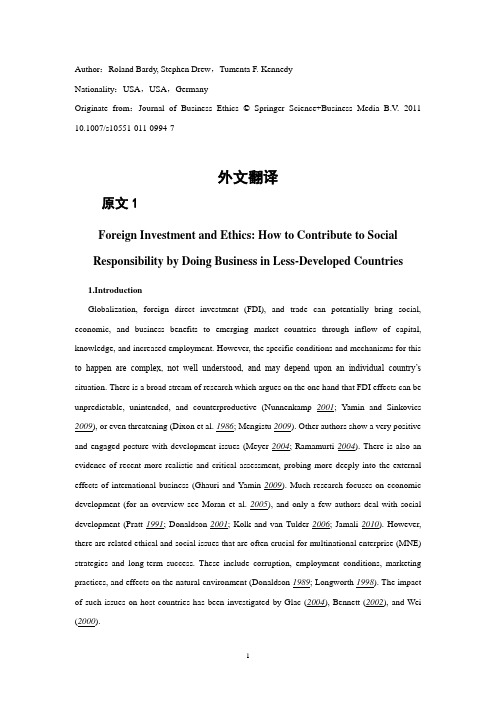
Author:Roland Bardy, Stephen Drew,Tumenta F. KennedyNationality:USA,USA,GermanyOriginate from:Journal of Business Ethics © Springer Science+Business Media B.V. 2011 10.1007/s10551-011-0994-7外文翻译原文1Foreign Investment and Ethics: How to Contribute to SocialResponsibility by Doing Business in Less-Developed Countries1.IntroductionGlobalization, foreign direct investment (FDI), and trade can potentially bring social, economic, and business benefits to emerging market countries through inflow of capital, knowledge, and increased employment. However, the specific conditions and mechanisms for this to happen are complex, not well understood, and may depend upon an individual country’s situation. There is a broad stream of research which argues on the one hand that FDI effects can be unpredictable, unintended, and counterproductive (Nunnenkamp 2001; Yamin and Sinkovics 2009), or even threatening (Dixon et al. 1986; Mengistu 2009). Other authors show a very positive and engaged posture with development issues (Meyer 2004; Ramamurti 2004). There is also an evidence of recent more realistic and critical assessment, probing more deeply into the external effects of international business (Ghauri and Yamin 2009). Much research focuses on economic development (for an overview see Moran et al. 2005), and only a few authors deal with social development (Pratt 1991; Donaldson 2001; Kolk and van Tulder 2006; Jamali 2010). However, there are related ethical and social issues that are often crucial for multinational enterprise (MNE) strategies and long-term success. These include corruption, employment conditions, marketing practices, and effects on the natural environment (Donaldson 1989; Longworth 1998). The impact of such issues on host countries has been investigated by Glac (2004), Bennett (2002), and Wei (2000).2.Incentive and Advantage Based EthicsPre-modern philosophy considered (universal) standards as given. We argue that a different approach which comes closer to relativism and even constructivism is needed in contemporary complex global business. Homann (2002) states that in the age of globalization, moral foundations should be based on advantages and incentives, and that ethics is not about following rules, but about developing them, i.e. not about just following rules but setting the rules of the game. With so-called “incentive- and advantage based ethics” (Luetge 2005), the question is not whether altruism or other nonadvantage seeking behaviors are historic anachronisms nor if practice has proven that only self-interested behavior leads to beneficial economic result.There is a long tradition—both in public and academic discourse—of discussing the tension-filled relationship between profit and morality under competitive market circumstances (Hemphill 2004). Often, proof is sought by recurring to a list of moral concerns, which includes environmental pollution, global warming, child labor, human rights violations, the deterioration of social standards like job security, and the fight against corruption. In these instances, and in many more, what for a long time has been looked at as clash between private interest and public interest, is now becoming a collaborative issue. Private business firms seem increasingly willing to take on the role of corporate citizens by embracing the rights and duties of political actors. They have engaged in rule-finding discourses as well as rule-setting processes in which they actively cooperate with government actors and/or civil society organizations. But what are their motives and their incentives, and what is required to encourage the pursuit of ethical behavior? One answer lies with what Boatright (1999) has called the “mistake” on which business ethics often rest.3.Attracting and Conducting FDI: A Two-Way StreetThrough FDI, a company not only penetrates a host country’s m arket, it may also gain access to resources, economies of scale and scope in production, logistics, and marketing processes. Important markets include supply chains, distribution networks, and end customers. Whether a firm chooses FDI rather than serving foreign markets through exporting, licensing, alliances, or other means is determined by three factors (Dunning and Lundan 2008). These include: a transferable competitive advantage in the home-market, specific characteristics of the foreign market which allow the firm to exploit its competitive position in that market, and the firm’s ability to increase its competitive position by taking advantage of what the host country has tooffer for controlling the entire value-chain. All three conditions must be present or FDI may not take place (Dunning and Lundan 2008). The firm-specific advantages which constitute spillover effects of FDI (proliferation of technology, secondary employment, and enhancement of skills) are often what less-developed countries need for their growth and development. The host country and the investor may focus on the location-specific advantages as factors to entice higher levels of FDI inflows.When the three conditions as stated above are missing then FDI either does not occur or occurs only at very low levels. This explains why some areas of the world, especially the poorest, fail to attract FDI. Although FDI flows to Africa have increased in recent years, these represent only a small portion of the total flows to developing countries. Average annual FDI flows increased from US $ 2.2 bn. in 1980, to 15 bn. during the period 2000–2004. However, Africa’s share of global flows fell from 2.3% in 1980 to about 1.5% during 2000–2004. As a percentage of total flows to developing countries, Africa’s share fell from 10% in 1980 to 7% during 2000–2004 (Cleeve 2009). Local infrastructure, effective macroeconomic policy, and reliable data of possible host nations are decisive in choice of location for foreign firms. These are often lacking in Africa.Knowledge of a country or region is crucial in the choice of location, and without this, investors may underestimate entrepreneurial opportunities or overestimate risks, pushing such locations to the periphery of the decision-making process. But there are investment opportunities in almost any region of Africa. According to UNCTAD (2011a), Africa offers the highest return on FDI in the world, far exceeding all other regions. While not yet as competitive as the BRIC countries, the demographics bode well for Africa as a market as more than half its population is under the age of 24. Europe’s population will lose 60 million people by 2050, however, Africa will add 900 milli on. Ironically, Africa’s very poverty creates opportunities: Education; healthcare; infrastructure; banking the unbanked; and middle class aspirational consumer goods etc. (Luiz 2010). Some areas in sub-Saharan Africa still have deficiencies in all these areas, and more often than not, the risk profile is heightened by political and institutional instability and unpredictability and high levels of corruption (Ngowi 2001). Investors need reliable information, but too often the official statistics are lacking or unreliable and official sources cannot provide robust data on markets, business partners, and available labor (Kennedy 2011).Unfortunately, when reliable information is absent, and when all ingredients of a riskyenvironment are present, the vicious cycle of poverty continues. FDI does not take place and the associated possible benefits cannot be exploited. This is where the instruments of solidarity with the poor and strong transnational institutions have a vital role. The International Development Association (IDA) is a division of the World Bank that helps the world’s poorest countries. IDA complements the World Bank’s other lending arm, the International Bank for Reconstruction and Development (IBRD), which serves middle-income countries with capital investment and advisory services. IBRD and IDA share the same staff and evaluate projects with the same rigorous standards. These common standards encourage private investors to follow suit and resolve the informational and infrastructural deficits.4.Cases from Sub-Saharan CountriesIn the Republic of South Africa, quite a few investments have been directed at the specifics of this region’s consumers and producers. One of the biggest FDI deals of 2001 was Saudi Oger’s USD180 million investment in Cell C, the new cellular operator. Also in 2001, Malaysian Resources Corporation announced a USD 200million property development. Global Environment Fund acquired forestry assets worth USD150 million billion from Mondi and formed Global Forest Products,signaling its intention to bid for state-owned forestry assets. These ventures not only contribute to improving the base for follow-up investments that broaden the opportunities for local small businesses, they are also directed toward improving communication throughout rural areas and providing new skills to hitherto unskilled labor (Akinboade et al. 2006).The second case is from Uganda, which in the past was shunned by investors, but has over the past 20 years attracted a significant number of investors mainly in response to the implementation of far-reaching economic and structural reforms. Privatization of state enterprises and the return of confiscated enterprises and properties to the Asians who had been expelled form the country during the Idi Amin dictatorship, have positively affected the attraction of FDI. But a major impact on social development stems from the services sector FDI which has grown rapidly in Uganda. Typical of this is accounting and computer services, warehousing, transportation and communication, and other services to support the manufacturing sector. In addition, the liberalization of the economy coupled with local demand for services like mobile telephony has attracted investments from big players on both the regional and international scene, such as V odafone and MTN.Another example for positive FDI effects is the agro-business investments in various sub-Saharan states. In recent years, agriculture is being perceived as a sector that not only offers investment opportunities for the private sector but also a drives local development of agriculture-related industries and the rural nonfarm economy (World Bank 2007). In East Africa, fisheries are an expanding sub-sector due to the presence of some of the largest fresh water lakes in the world. Lake Victoria, half of which is in Uganda, is the second largest freshwater lake in the world. Similarly, Ghana, Côte d’Ivoire and Cameroon have a ttracted investments in cocoa processing as a result of suitable agro-climatic conditions for cocoa production.From this type of investments, the low-skilled labor force which is employed in subsistence farming purposes is being converted into skilled labor with processed foods gaining prominence in both domestic and global markets. And the primary investments spur follow-ups like the DrumNet project implemented launched by Pride Africa that uses a mobile phone interface to link smallholder farmers to ban ks, farm input suppliers and agricultural buyers.The project’s premise is that information on the market is one of the key elements that keeps farmers from getting the full market value for their products. This lack of information keeps the farmers in a disadvantageous financial position, making it difficult for them to obtain the financing and resources they need to grow their business. DrumNetprovides marketing, financial, and informational services aimed at stimulating wealth creation and the economic integration of smallholder farmers.To conclude this list of examples, reference shall be made to private sector participation in agricultural water development, which has been developing over the last decade in e.g. Kenya, Niger, and Cameroon. Private investment here uses increased technologies for in-field rainwater management for dryland crops, the objective of which is to increase the effectiveness of rainfall to stabilize and enhance yields. The most promising of these are the various types of conservation farming, including deep tillage, reduced tillage, zero tillage, and various types of planting basins, all of which have been successfully demonstrated in many parts of the region, both in the semi-arid and dry sub-humid zones. The results have been impressive, particularly when the technology input has been combined with what is called “Farmers’ Field Schools”.5.Summary and TrendsThe current wave of globalization has intensified the competition for FDI among developing countries, and all actors share responsibility to make changes in attitudes, policies, and structures(Dupasquier and Osakwe 2005). International organizations, national governments, business, labor, civil society, and the media each have important roles to play.Opportunistic and short-term ventures driven only by the profit motive are becoming less acceptable, bringing corporations pursuing such strategies into disrepute, and making them targets for a technology-enabled global community of activists and NGOs. Strategies that not only add to business value but also lead to long-term economic and social improvements are increasing in significance. Profit seeking by, e.g., selling luxury goods or high-end eco-tourism destinations to an elite of wealthy customers and using parts of the profit to address social inequality issues, will not be sufficient. Serving the needs of customers at the top of the pyramid is becoming less important than meeting the needs of those at the bottom of the pyramid and the increasing ranks of the middle classes with similar ambitions to their counterparts in developed nations. It also seems the world has started to commit itself to a number of principles and values. Fair globalization means making these values an integral part of the process of global economic integration.This paper has highlighted the complexity and challenges of moving to a more socially responsible vision of capitalism across borders. There is a wide body of theoretical and empirical literature on the economic effects of FDI. However, studies addressing the links between cross-border business and ethical considerations are less abundant. This paper describes a growing body of study and evidence relating FDI, ethics, CSR, and poverty alleviation. We have addressed poverty alleviation as a key question for global ethics and in particular sub-Saharan Africa.译文1国外投资和道德标准:在欠发达国家如何通过商业经营为社会责任做出贡献1.导言经济全球化,外商直接投资(FDI),和贸易通过资本和知识的流入很可能为新兴市场国家带来社会、经济和商业利益,增加就业机会。
国际商务英语单词
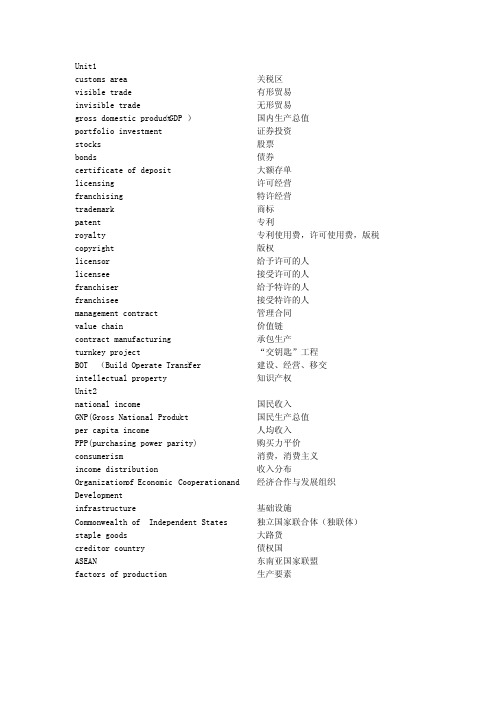
Unit1customs areavisible tradeinvisible tradegross domestic product(GDP)portfolio investmentstocksbondscertificate of depositlicensingfranchisingtrademarkpatentroyaltycopyrightlicensorlicenseefranchiserfranchiseemanagement contractvalue chaincontract manufacturingturnkey projectBOT (Build Operate Transfer) intellectual propertyUnit2national incomeGNP(Gross National Product)per capita incomePPP(purchasing power parity) consumerismincome distributionOrganization of Economic Cooperation a nd DevelopmentinfrastructureCommonwealth of Independent States staple goodscreditor countryASEANfactors of production 关税区有形贸易无形贸易国内生产总值证券投资股票债券大额存单许可经营特许经营商标专利专利使用费,许可使用费,版税 版权给予许可的人接受许可的人给予特许的人接受特许的人管理合同价值链承包生产“交钥匙”工程建设、经营、移交知识产权国民收入国民生产总值人均收入购买力平价消费,消费主义收入分布经济合作与发展组织基础设施独立国家联合体(独联体)大路货债权国东南亚国家联盟生产要素economic integrationput up barriersfree trade areatariff ratesquota restrictionsNorth American FreeTrade Agreement(NAFTA)customs unioncommon marketsovereign statepolitical entitysignatorysettlementbanknotescirculationexecutive bodyEuropean Commissioncommissionercouncil of ministersmulti-polarizationDual-Ministerial Meetingsub-committeecartedOPECin a detourterritory economics internationalizationinternational economic environment double digittechnical improvementsday-to-day runningjurisdictionaffiliateshare holdershost countriesnatural resourcesprimary commoditiesspecializationeconomies of scaleendowment of naturecapital,land and labourabsolute advantagecomparative advantagetariffs barriers 经济一体化设置障碍自由贸易区关税税率配额限制北美自由贸易协定关税同盟共同市场主权国家政治实体签字国,签字人结算纸币,钞票货币流通行政机构,执行机构 欧盟委员会委员,特派员,专员 部长理事会多极化双部长会议分委员会卡特尔,联盟石油输出国组织以迂回的方式区域性经济体国际化国际经济环境两位数字的技术进步日常管理权利,管理范围分支机构,附属机构 股东东道国自然资源初级产品专业化规模经济自然的赋予资本、土地和劳动力绝对利益比较利益关税壁垒quotacustoms unionimport dutiesexport dutiesad valorem dutiesspecific dutiescompound dutiesdrawbackmost-favoured-nation(MFN)treatment concessiontariff schedulenon-tariff barriermeans of transportinland water vesselscargo compartmentplaces of historical interest accommodationsimmigrantremittancetrade termstrading practicesamendmentpremisesdestinationroll on-roll off trafficcustoms clearancetrade fairstrunk callenquiryquotationvalidity periodoffereecounter offersales contractsales(purchase)confirmation business linecontract properconsignmentcontracting partiesforce majeurearbitrationcotton piece goodscotton yarnsarticle number 配额关税同盟进口关税出口关税从价税从量税复税,混合关税退税最惠国待遇让步税率表,税则非关税壁垒运输工具内河船只货仓古迹膳宿供应,招待设备移民汇款贸易术语;交易条件贸易惯例修正案;修正条款;修改(企业、机构等使用的)生产场所经营场址 目的地,终点滚装滚卸式运输结关商品交易会长途电话询盘,询价报价有效期收盘人还盘销售合同售货(购货)确认书业务范围,经营范围合同本身,合同正文寄售缔约方不可抗力仲裁棉布棉纱货号counter tradeterminologynet positionshyperinflationEuropean Payment Unioncompetitive devaluation photocopying machineclearing systemcompensation tradeprocessing tradeleasingagencypolicy objectivesprotectionismfinancial marketcentrally planned economiesdebtordebitfinancial standingcreditworthinessperiodic paymentscash in advancedraftbill of exchangedrawerdraweepayeeusance draft(tenor draft,term draft) documentary draftclean draftbill of ladingtitle to the goodsinsurance policydocumentary collectiondocuments against payment(D/P) documents against acceptance(D/A)go bankruptopen accountapplicantopening bankbeneficiarycorrespondent bankadvising bankconfirming bank 对销贸易;反向贸易术语实际头寸极度通货膨胀欧洲支付联盟竞争性贬值复印机清算系统,清算制度补偿贸易加工贸易租赁代理政策目标贸易保护主义金融市场中央计划经济国家债务人借方,记入借方的款财务状况资信可靠状况分阶段付款预付现金汇票汇票出票人受票人受款人远期汇票跟单汇票光票提单货物所有权保险单跟单托收付款交单承兑交单破产记账交易开证申请人(也叫opener或principal) 开证银行受益人往来行,关系行通支行保兑行unit pricepartial shipment transshipmentprice termscarrying vessel mechanismclean creditnon-trade settlement revocable credit irrevocable credit confirmed creditleading bankdouble assurancesight creditusance creditcapital turnoverface valuetransferable creditnon-transferable credit middlemannon-draft creditdeferred payment revolving credittake delivery of commissiondiscountshipping markssignaturein general termsmemos(memorandum) consignorcarriageconsigneenotify partyairway billcargo receiptthe insuredcurrencycommercial invoiceport of shipmentshipping advicenatural product provinces carriercommon carrier 单价分批装运转船价格条款,价格术语运载船只,载货船只机制光票信用证非贸易结算可撤销信用证不可撤销信用证保兑信用证主要银行双重保障即期信用证远期信用证资金周转面值可转让信用证不可转让信用证中间人无汇票信用证推迟付款循环信用证提(货)佣金折扣唛头,运输标记签字用概括性的词语,用一般性词语表达 备忘录,便笺托运人运输收货人被通知人空运提单铁路运单,货运收据被保险人货币商业发展发货港,起运港装船通知产品自然领域承运人,运载工具公共承运人contract carrierprivate carrier entrepreneurintermediate product finished productsper-unitshipperinventoryjust-in-time inventory logisticscost economiesintermediate products insurerenterprisepoolpremiumclaimclientmarginhandmaidenknown premiumrelease of fundstime lagunderwritersutmost good faithport of originbrand-newplatinumindemnitytie upcontributionpro rateFord carpercentagesubrogationnegligentforwarding charges proximate cause of the loss insurable interestthe capital tied up exchange rategold standardpar valuereserve currency 契约承运人自有承运人企业家,业主中间产品制成品每一单位托运人,发货人,货主存货,库存零库存物流节约成本,成本节约中间产品承保人企业,公司统筹的资金;共同款项保险费索赔顾客,主顾保证金起服务(或辅助)作用的事物已知的保险费腾出资金在时间上的间隔保险公司最大诚信货物原产地港口崭新的白金损失赔偿占用,冻结分摊按比例(美国)福特轿车百分比;(全部中的)所占比例:部分 代位;取代疏忽的,玩忽的交货费用导致损失的直接原因可保险权益占用的资金汇率,兑换率金本位制平价储备货币interactionclean floatdirty floatvice versaspecial drawing right BOP deficitdiscount rateidle fundsdirect quoteindirect quotebuying rateselling ratemedial ratemultilateralfinancial resources earningsspell outcriterionsubscription replenishments prerequisitepopulation-planning nutritioncornerstonecapital marketborrowing powergold tranchereservegrace periodprivate sectorequity investmentcut across sectoral lines standby arrangement investment returns beveragetunacannerybiogeneticsbiotechnology Volkswagencustomer mobility inventorytax holidayacquisition 交互作用清洁浮动肮脏浮动反过来也是这样,反之亦然特别提款权国际收支赤字贴现率邮资(汇率)直接标价(汇率)间接标价买入价卖出价中间价多边的,多国(或多方)参加的 资金收益,赢利详细说明,明确规定标准,准则捐助,认捐补充或增加的(资金)必备条件,先决条件人口计划营养基石资本市场借款权黄金份额储备金,准备金优惠期,宽限期私营经济股权投资超越部门界限备用(信贷)安排投资收益,投资回报饮料金枪鱼罐头食品厂生物遗传学生物工艺学大众汽车客户流动存货免税期并购start from scratchjoint ventureparentthe greenfield strategyinvestorsecuritiesstatuteequitiesindicesgilt-edged stocksbrokerjobbersecondary capital marketmarket floorlisted marketincome taxqualificationsstanding committeecriteriaVATshortfallpractitionerlong-term capitalprimary capital raisingoptionsaccession tobe traced back tocontroversyframeworkGeneralized System of Preferences non-discriminatepredecessorfull employmentthe most-favored nation clause trade-relatedfull-fledgedverdicttariff concessionroundinstitutional strengththresholdcounter-veiling measuresanti-dumpingnational treatment 白手起家,从零开始合资企业母公司,总公司,创始组织绿地战略投资者有价证券法令,法规,成文律(股息不定的)普通股,股票 (index的复数形式)指数金边证券经纪人,中介人,掮客股票买卖经纪人二级资本市场交易场地挂牌证券交易市场所得税资格常务委员会(criterion的复数形式)标准增值说(全称为value added tax) 亏空,不足开业者长期资本对新发行的有价证券的筹措活动 期权(合同),选购权加入追溯到争议,争论框架,机构普惠制不加区别的,非歧视的前任,原来的事物充分就业最惠国条款与贸易有关的完全合格的,名副其实的裁决,判决关税减让回合制度力量,行政力量门槛,开端反贴补措施反倾销国民待遇tariff quotafair tradeECOSOCforumterms of tradeescape clausesterritoryaction programmepreferential customs tariffsorganconferencepreferencenon-discrimination principledifferential treatment new international economic ordertransfer of technology 关税配额公平贸易联合国经济及社会理事会公开讨论的机会;论坛贸易条件免责条款,例外条款领土,领地行动纲领特惠税机构,机关(正式)会议(年会)优先(权);优先选择(权) 无差别待遇原则差别待遇国际经济新秩序技术转让。
成绩单-吉林财经大学
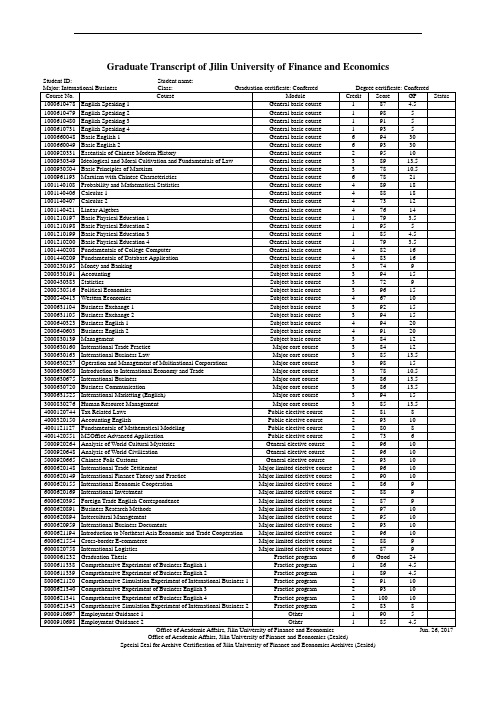
General basic course
6
78
21
1001140108
Probability and Mathematical Statistics
General basic course
4
89
18
1001140406
Calculus 1
Public elective course
2
93
10
4001121127ห้องสมุดไป่ตู้
Fundamentals of Mathematical Modeling
Public elective course
2
80
8
4001420551
MSOffice Advanced Application
Public elective course
Practice program
2
91
10
8000621340
Comprehensive Experiment of Business English 3
Practice program
2
93
10
8000621341
Comprehensive Experiment of Business English 4
Major core course
3
94
15
3000830276
Human Resource Management
Major core course
3
85
13.5
4000120744
Tax Related Laws
国际商务专业词汇(中英文对照)
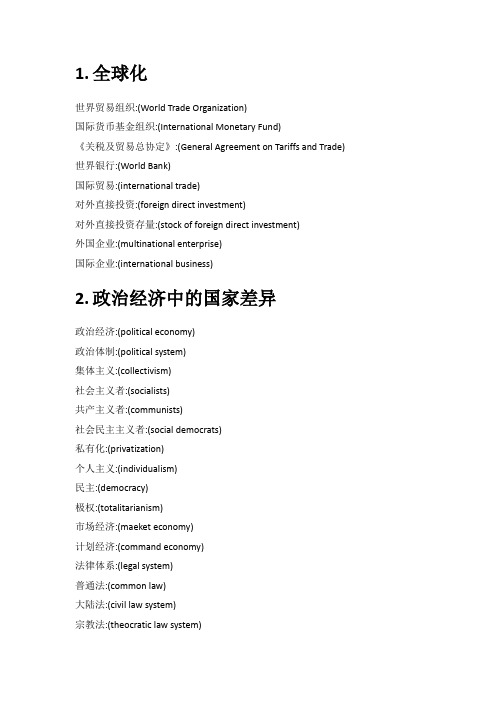
1.全球化世界贸易组织:(World Trade Organization)国际货币基金组织:(International Monetary Fund)《关税及贸易总协定》:(General Agreement on Tariffs and Trade)世界银行:(World Bank)国际贸易:(international trade)对外直接投资:(foreign direct investment)对外直接投资存量:(stock of foreign direct investment)外国企业:(multinational enterprise)国际企业:(international business)2.政治经济中的国家差异政治经济:(political economy)政治体制:(political system)集体主义:(collectivism)社会主义者:(socialists)共产主义者:(communists)社会民主主义者:(social democrats)私有化:(privatization)个人主义:(individualism)民主:(democracy)极权:(totalitarianism)市场经济:(maeket economy)计划经济:(command economy)法律体系:(legal system)普通法:(common law)大陆法:(civil law system)宗教法:(theocratic law system)合同法:(contract law)财产权:(property rights)私下行为:(private action)公共行为:(public action)《反海外腐败法》:(Foreign Corrupt Practices Act)知识产权:(intellectual property)专利:(patent)版权:(copyrights)商标:(trademarks)产品安全法:(product safety laws)产品责任:(product liability)3.政治经济和经济发展人均国民收入:(gross national income)购买力平价:(purchasing power parity)人文发展指数:(Human Development Index)创新:(innovation)创业者:(entrepreneurs)放松管制:(deregulation)第一进入者优势:(first-mover advantages)后进者优势:(late-mover disadvantages)政治风险:(political risk)经济风险:(economic risk)4.文化差异跨文化知识能力:(cross-cultural literacy)价值观:(values)准则:(norms)社会:(society)社会习惯:(folkways)道德准则:(ethics)社会结构:(social structure)群体:(group)社会阶层:(social strata)社会流动性:(social mobility)等级制度:(caste system)阶级制度:(class system)阶级意识:(class consciousness)宗教:(religion)伦理体系:(ethical systems)关系:(relationship)联系:(connection)权利距离:(power distance)个人主义:(individualism versus)集体主义:(collectivism)不确定性规避:(uncertainty avoidance)男性主义和女性主义:(masculinity versus femininity)儒家动力:(confucian dynamism)种族中心主义:(ethnocentrism)5.国际商务伦理商业伦理:(business ethics)伦理策略:(ethics strategy)社会责任:(socisl responsibility)伦理困境:(ethical dilemmas)组织文化:(organizayion cultural)文化相对论:(cultural relativism)道德论者:(righteous moralist)非道德论者:(native immoralist)实用主义伦理:(utilitarian approaches)权利理论:(rights theories)公正分配:(just distribution)无知之幕:(veil of ignorance)道德公约:(code of ethics)利益相关者:(stakeholders)6.国际贸易理论自由贸易:(free trade)新贸易理论:(nwe trade theory)重商主义:(mercantilism)零和博弈:(zero-sum game)绝对优势:(absolute advantage)规模报酬率:(constant returns to specialization)要素禀赋:(factor endowments)规模经济:(economies of scale)国际收支账户:(balance-of-payments accounts)经常账户:(current account)经常账户赤字盈余:(current account deficit surplus)资本账户:(capital account)金融账户:(financial account)7.国际贸易中的政治经济自由贸易:(free trade)关税:(tariff)从量税:(specific tariffs)从价税:(ad valorem tariffs)补贴:(subsidy)进口配额:(import quota)关税配额:(tariff rate quota)自愿出口限制:(voluntary export restraint)配额租金:(quota rent)国产化规定:(local content requirement)行政管理贸易政策:(administrative trade policies)倾销:(dumping)反倾销政策:(antidumping policies)抵消性关税:(counter vailing duties)幼稚工业论:(infant industry argument)战略贸易政策:(strategic trade policy)8.国际直接投资新设投资:(greenfield invsetment)流量:(flow of FDI)存量:(stock of FDI)对外直接投资:(outflows of FDI)外来直接投资:(inflows of FDI)固定资本形成总额:(gross fixed capital formation)折中理论:(eclectic paradigm)出口:(exporting)技术授权:(licensing)内部化理论:(internalization theory)不完善理论:(market imperfections approach)寡头垄断行业:(oligopoly)多点竞争:(multipoint competition)区位优势:(location-specific advantages)外部性:(externalities)国际收支账户:(balance-of-payments accounts)经常项目:(current account)离岸生产:(offshore production)9.区域经济一体化区域经济一体化:(regional economic integration)自由贸易区:(free trade area)关税同盟:(customs union)共同市场:(common market)经济联盟:(economic union)政治联盟:(political union)贸易创造:(trade creation)贸易转移:(trade diversion)执行董事会:(executive board)监管董事会:(governing council)最优货币区:(optional currency area)10.外汇市场外汇市场:(foreign exchange market)汇率:(exchange rate)外汇风险:(foreign exchange risk)外汇投机:(currency speculation)套息交易:(carry trade)即期汇率:(spot exchange rate)远期外汇:(forward exchange)远期汇率:(forward exchange rate)掉期:(currency swap)套汇:(arbitrage)载体货币:(vehicle currency)一价定律:(law of one price)效率市场:(efficient market)应用材料:(applied materials)费雪效应:(Fisher effect)跟风效应:(bandwagon effect)效率市场:(efficient market)无效市场:(inefficient market)自由兑换:(freely convertible)对外可兑换:(externally convertible)不可兑换:(nonconvertible)资本外逃:(capital flight)对等贸易:(counter trade)交易风险:(transaction exposure)折算风险:(translation exposure)经济风险:(economic exposure)提前策略:(lead strategy)错后策略:(lag strategy)11.国际货币体系国际货币体系:(international monetary system)浮动汇率:(floating exchange rate)盯住汇率:(pegged exchange rate)管理浮动:(dirty float)固定汇率:(fixed exchange rate)金本位制度:(gold standard)黄金平价:(gold par value)贸易收支平衡:(balance-of-trade equilibrium)管理浮动制度:(managed-float system)货币局制度:(currency board)货币危机:(currency crisis)银行危机:(banking crisis)外债危机:(foreign debt crisis)裙带资本主义:(crony capitalism)道德风险:(moral hazard)12.全球资本市场共享方差:(shared variance)对冲基金:(hedge funds)游资:(hot money)耐心货币:(patient money)外国债券:(foreign bonds)13.国际企业的战略战略:(strategy)盈利能力:(profitability)投资资本收益率:(ROIC)利润增长:(profit growth)价值创造:(value creation)运营:(operations)核心竞争力:(core competence)区位经济:(location economies)全球网络:(global web)经验曲线:(experience curve)学习效应:(learning effects)规模经济:(economies of scale)普遍需要:(universal needs)全球标准化战略:(global standardization strategy)本土化战略:(localization strategy)跨国战略:(transnational strategy)国际战略:(international strategy)14.国际企业的组织组织构架:(organizational architecture)组织结构:(organizational structure)控制系统:(control systems)奖励:(incentives)流程:(processes)组织文化:(organizational culture)垂直差异化:(vertical differentiation)水平差异化:(horizontal differentiation)建立整合机构:(integrating mechanisms)国际分部:(intermational division)世界范围的地区结构:(worldwide area structure)世界范围的产品分部:(worldwide product division structure)全球矩阵结构:(global matrix structure)知识网络:(knowledge network)个人控制:(personal control)行政组织结构:(bureaucratic control)产出控制:(output control)文化控制:(cultural control)绩效模糊:(performance ambiguity)15.进入战略和战略联盟战略联盟:(strategic alliance)私营部门债务:(private-sector debt)进入时机:(timing of entry)先入者优势:(first-mover advantages)开拓成本:(pioneering costs)交钥匙工程:(turnkey project)技术授权协议:(licensing agreement)技术授权协议:(cross-licensing agreement)特许经营:(franchising)合资企业:(joint venture)全资子公司:(wholly owned subsidiary)16.出口、进口和对等贸易出口管理公司:(export management company)信用证:(letter of credit)汇票:(draft)即期汇票:(sight draft)远期汇票:(time draft)提单:(bill of lading)进出口银行:(Export-Import-Bank)对等贸易:(counter trade)易货贸易:(barter)互购:(counter purchase)抵销:(offset)转手贸易:(switch trading)回购:(buy back)从价关税:(ad valorem tariff)委托代销:(consignment)禁运:(embargo)全球配额:(global quota)无形贸易壁垒:(invisible barriers to trade)信用证:(letter of credit)重商主义:(mercantilism)201条款:(section 201)17.全球生产、外包与物流生产:(production)物流:(cogistics)全面质量管理:(total quality management)六西格玛:(six sigma)最小效率规模:(minimum efficient scale)柔性制造技术:(flexible manufacturing technology)精益生产:(lean production)大规模定制:(mass customization)柔性机器单元:(flexible machine cells)价值重量:(value-to-weight)全球学习:(global learning)来源决策:(make-or-buy decisions)专业化资产:(specialized asset)动态能力:(dynamic capabilities)即时存货:(just-in-time)电子数据交换:(electronic data inferchange) 18.全球营销与开发营销组合:(marketing)市场细分:(market segmentation)集中零售体系:(concentrated retail system)分散零售体系:(fragmented retail system)渠道长度:(channel length)独占性的分销渠道:(exclusive distribution channel)渠道质量:(channel quality)源效应:(source effects)原产国效应:(country of orign effects)噪声:(noisy)推策略:(push strategy)拉策略:(pull strategy)需求价格弹性:(price elasticity of demand)富有弹性:(elastic)缺乏弹性:(inelastic)策略性定价:(strategic pricing)掠夺性定价:(predatory pricing)多点定价:(multipoint pricing)经验曲线定价:(experience curve pricing) 19.全球人力资源管理人力资源管理:(human resource management)外派经理:(expatriate manager)人员配备政策:(staffing policy)企业文化:(corporate culture)外派人员:(expatriates)内派人员:(inpatriates)外派失败:(expatriate failure)自我倾向:(self-orientation)他人倾向:(others-orientation)感知能力:(perceptual ability)文化刚性:(cultural thoughness)20.国际企业会计和财务会计准则:(accounting standards)审计准则:(auditing standards)内部远期汇率:(internal forward rate)货币管理:(money management)交易成本:(transaction costs)双边净额:(bilateral netting)多边净额:(multilateral)税收抵免:(tax credit)税收条款:(tax treaty)延期准则:(deferral principle)避税港:(tax havens)特许权使用费:(royalties)转移价格:(transfer price)弗罗廷贷款:(fronting loan)。
国际商务谈判(英文) 全套课件

•
基本概念与谈判原则
• 1.2 Correct understanding of negotiation
•
对谈判的正确理解
• 1. 3 Stages Βιβλιοθήκη f negotiation•
谈判的几个阶段
• 1.4 Psychology in negotiating
•
谈判的心理
Introduction
• Everybody negotiates all the time, at work, at home, and as a consumer. We can say that since the beginning of time, or since the development of human language, there has been negotiations made amongst humans. Negotiating as a significant social activity is a means of dealing with human relationships and resolving conflicts and has never been nonexist. On the other hand, negotiation as a product of social competition has got its different meaning and content with the development of the times.
Characteristics of business negotiation
• Some of the characteristics of business negotiation include:
国际商务英语谈判答案(全)
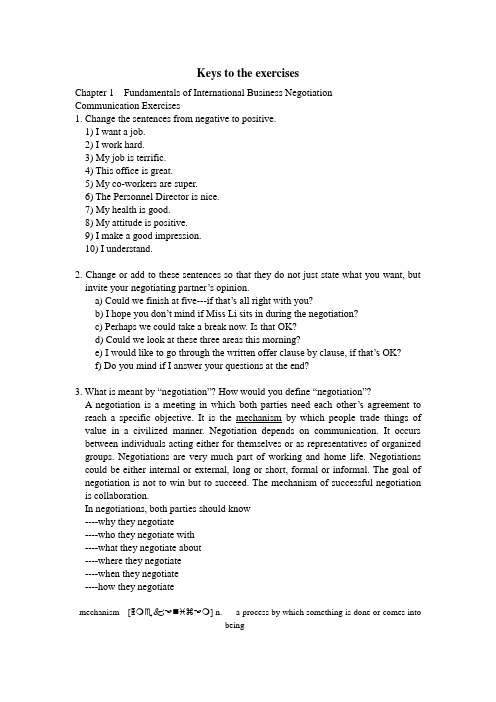
Keys to the exercisesChapter 1 Fundamentals of International Business NegotiationCommunication Exercises1. Change the sentences from negative to positive.1) I want a job.2) I work hard.3) My job is terrific.4) This office is great.5) My co-workers are super.6) The Personnel Director is nice.7) My health is good.8) My attitude is positive.9) I make a good impression.10) I understand.2. Change or add to these sentences so that they do not just state what you want, but invite your negotiating partner’s opinion.a) Could we finish at five---if that’s all right with you?b) I hope you don’t mind if Miss Li sits in during the negotiation?c) Perhaps we could take a break now. Is that OK?d) Could we look at these three areas this morning?e) I would like to go through the written offer clause by clause, if that’s OK?f) Do you mind if I answer your questions at the end?3. What is meant by “negotiation”? How would you define “negotiation”?A negotiation is a me eting in which both parties need each other’s agreement to reach a specific objective. It is the mechanism by which people trade things of value in a civilized manner. Negotiation depends on communication. It occurs between individuals acting either for themselves or as representatives of organized groups. Negotiations are very much part of working and home life. Negotiations could be either internal or external, long or short, formal or informal. The goal of negotiation is not to win but to succeed. The mechanism of successful negotiation is collaboration.In negotiations, both parties should know----why they negotiate----who they negotiate with----what they negotiate about----where they negotiate----when they negotiate----how they negotiatemechanism [ ] n.---- a process by which something is done or comes intobeing途径4. Fill in the blankshuman, negotiable, interest, giving, trust5. Answer the following questions1) Physical or survival needs; Security and safety needs; Social needs; Ego oresteem needs; Self-realization needs2) Exploration, bidding, bargaining, settling and ratifying.6. Put the following into English1) Are you negotiable?2) I'm sure there is some room for negotiation.3) Before we have anything to negotiate, you have to make me an offer.4) We could add it to the agenda.5) Would anyone like something to drink before we begin?6) See what I can do.7) I would if I could.8) I know I can count on you.9) We'll come out from this meeting as winners.10) I'll try to make you happy.7. True or false1) T 2) T 3) T 4) F (Everything is negotiable.)5) F (bargaining stage)6) F ( Do not often. Sometimes they will follow the sequence n one aspect of thedeal and then start all over again on a second aspect.)7) T8) F (May not. Because either side may be wiling to say what it thinks or take aposition and stick to it )9) T 10)Negotiation skills1.What determines a success in negotiation? Success in negotiation is when the parties to the negotiation reach an agreement to which they are both committed and which they will implement in full.committed [ ☜❍♓♦♓♎] v.----尽责的implement [ ♓❍☐●♓❍☜⏹♦] v.----to put into practical effect; carry out使生效;执行2. What are the elements of a successful negotiation process?There are seven basic elements that should be considered when analyzing the negotiation process:a.The relationship among the parties.b.The parties' interests -- why they need to reach their stated objectivesc.An understanding of the choices available if the parties cannot reachagreement, often called their BATNA -- Best Alternative To a Negotiated Agreementd.Creativity which will expand the bargaining choices among which the partiescan choose to reach agreemente.Fairness -- a person who negotiates unfairly may be able to force an agreement,but the 'forced' party will be reluctant to fulfill their share of the agreementf.Whether commitment has been reached. Will the parties each feel committedto doing what they have agreed? Is each party capable of fulfilling their share of the deal?g.Negotiation is all about communicating information. If one party knowseverything then why do they need to negotiate with anyone else?And the foundation of good negotiation is preparation. Be prepared and the negotiation will bring a result that really works. If well prepared you are less vulnerable to surprise, and that increases the likelihood you'll be happy with the result.vulnerable [ ✈●⏹☜❒☜♌☎☜✆●] adj.----易受攻击的, 易受...的攻击3. Your client comes into your office and is exceedingly grumpy and difficult to talk to. How do you approach your client so as to make your meeting as productive as possible?Answer: (e)When the client is grumpy, their emotions will inevitably cloud their judgment and make it difficult to interact with them on substantive matters. At the same time, if they are experiencing anger, it is important to ensure them that we understand that they are upset. By acknowledging the client's anger and offering our assistance, the client will feel as though we are on the "same side" and treat us as friends and continue to direct their anger elsewhere- allowing us to focus on the substantive issues.substantive [ ♦✈♌♦♦☜⏹♦✋] adj.----of or relating to the essence 实质的Chapter 2 Proper Behaviors in International Business Negotiation Communication Skills1. What would you say if…a.Thank you./No, after you.b.Thanks. I’ll need it.c.Thanks. That’s very kind.d.Thanks for coming all the way.e.Thanks for helping. That was very kind of you.f. Thank you for thinking of me, but I’m afraid I can’t take it.2. Answer the following questions.(1) Only about half of what he or she heard(2) Not only does note taking force you to listen carefully, but it alsopsychologically throws the speaker off the balance when he or she sees you nodding and furiously writing away and having a record of all the facts and basically everything said. A further benefit of note taking is that you have the perfect excuse to avoid eye contact if you are afraid to reveal your reactions to someone’s proposals(3) Questions appear to be able to be divided into five basic functions:①Cause attention.②Get information.③Give information.④Start thinking.⑤Bring to conclusion.(4) There are two ways to assure a high degree of reliability for answers to yourquestions. One way is to lay the foundation for asking them. The second is through the use of the tactic called “bipolar questioning.”(5) A firm handshake gives the impression of quiet confidence and says that thisperson is glad to meet you.3. Choose the best answer.(1) D (2) C (3) B (4) A (5) (6) D (7) B (8) C (9) A (10)A4. Translate the following into English.(1) There’s a great demand for our new product.(2) This product has good prospects.(3) We need to talk about the basic terms of the transaction.(4) If your prices are reasonable and the quality is satisfactory, we shall placesubstantial orders with you.(5) It’s unwise for both of us to insist on his own price. Can we each make someconcession?(6) If you cannot reduce your price, we’d rather call the whole de al off.(7) If you want to expand your business in this market, you have to take flexibleways in adopting payment terms.(8) We regret that we cannot accept your demand for direct shipment.(9) This product has many advantages compared to other competing products.(10)I’m very glad that we have finally come to an agreement. We’ll go on to otherterms and conditions tomorrow. Is it all right with you?5. True or false.(1) F (2) T (3) F (4) T (5) F (6) T (7) F (8) F (9) F (10) TNegotiation Skills1. The person you are negotiating with continually repeats the same argument despite the fact that you have given them a number of counterarguments. What do you do to move the negotiation forward?Answer: (a)One of the most powerful tools in negotiation is how to listen to what the other party is saying. Very often, we are too focused on the points we are trying to get across to listen to what our counterparts are trying to say.If people keep repeating themselves, they are subconsciously sending a signal that they feel what they are saying is important. And they want us to acknowledge that we have heard and understand them.Accordingly, the best thing to do in this situation is to rephrase what they keep repeating and ask them if we have accurately restated their point. Only when they feel as though they have been heard will they be able to listen to usEffective listening involves much more than simply hearing and understanding what the counterpart is saying. Effective listening is a set of tools and techniques which expert negotiators use to gain control of the negotiation and turn it to their advantage.2. What are the key communication skills used in negotiation?The key communication skill in negotiation is to listen. There's an old saying: God gave us one mouth and two ears, and we should use them in that ratio.Obviously when we are listening, we need to be listening for useful information. Thus it is very important to plan ahead, thinking about what we can learn that will help us decide what approach to take and to learn about what appeals to the parties with whom we are negotiating. So think about the questions you're going to ask; the result should reward your listening with real problem-solving information.Chapter 3 Choosing the Negotiation TeamCommunication Exercises1. What is the more indirect question or statement behind the following sentences?a. I’m not entirely convinced by these forecasts.b.We’d like to know something about your planning.c.I’d be interested to hear a bit abou t payment.d.Your costs could cause one or two problems.e.Perhaps we could talk a little bit about figures.f.That figure looks a little on the high side.g.Delivery is an area which we’d like to explore a little further with you.h.I’d like to know more about your management structure.1.Write the name of the position in the blank.1) CEO/the president2) Assistant Manager, Europe3) Purchasing Clerk4) Personnel Assistant5) Vice-President, Administration3. (omitted)4. (omitted)5. Fill in the blanks1)maximum2) observers; advisers; speaking; training6. Translate the following into English1)Negotiation is a team sport.2)The negotiator’s function is to negotiate, while the functional specialists provide specialist advice or information.3) The team leader is the person who generates enthusiasm in his team to maintainsthe morale under all conditions.4) The team members must learn that the opponent and its representatives areadversaries although they may be friendly.5)I’m afraid you are not in our ballpark.6) Excuse me, but it seems to me we’re giving up too much in this case.7)That’s to o great a financial burden for us.8) 10% is beyond my negotiating limit.9)If you can guarantee that on paper, I think we can discuss this further.10)Could you explain what you mean by that?7. True or false1). F 2). T 3). T 4). F (maximize) 5). T 6). F (can’t)7). F (both sides) 8). T 9). T 10). F (There is no need to )Negotiation skills1. What do you think are the personal qualities of a good negotiator?A good negotiator needs to be:1) A good listener2)Open-minded3)Willing to do the homework to determine her/his interests, objectives,and alternatives4)Well-prepared5)Creative6)Able to merge what he knows about his own interests and resourceswith the interests and resources of his negotiation partner7)Someone who is always learning from experience, from other peopleand from historymerge [❍☜♎✞] v. ----to combine or unite 使合并或结合2. How to be a cool negotiator?Acting cool is a good part of successful negotiation. But one needs to make sure it is not just an act. The 'coolness' needed for successful negotiation really means keeping a cool analytical head. If there is any chance one should prepare ahead of time: what do I want and why do I want it? What do they want and why do they want what they want?During the process, one should find ways to take a step back from the discussion and look at what is going on with that same cool head. 'Why did he say that? What arguments or tactics are being used?3. How to control anger for effective negotiating?When tempted to get angry, remember to check whether or not it is your turn. If it is someone else's turn to get angry, sit there and take it by reminding you how wonderful you are to be in such control of your emotions.One fundamental rule is: only one person can be angry at a time. Don't let thesituation escalate, civility will slip away awfully quickly and there will be a very tough time healing the relationship or solving the initial issue.civility [♦♓♓●♓♦♓] n. ----a courteous act or utterance有礼貌的举止或表达4. What are the advantages and disadvantages of team negotiations?Negotiating as part of a team requires very careful preparation. The biggest danger in team negotiation is that your counterparts will see or hear that you and your colleagues don't agree with each other. If they can find differences, they may spot opportunities to drive wedges between your team members.wedge [♦♏♎✞] n.----something that intrudes and causes division or disruption侵入引起分裂的东西Teams can work together ahead of time on strategy: who is going to be thespokesperson on which issues? What information do we need and who is going to ask the relevant questions? Who can communicate what decisions to the 'other side'?What members of the team are the experts on technical matters, business matters, etc.?But even if a group of colleagues work hard at developing a commonly agreed strategy you will find that, there is still a risk that someone will say something out of turn or which is not part of his role. They need to explore how to cope with such problems during the actual negotiation.Individual negotiations have certain other advantages: the negotiator can present him/herself as the decision-maker or as the spokesperson for their company or colleagues. This gives the individual negotiator considerable flexibility that may not be available in team negotiation situations.Chapter 4 Preparing for NegotiationCommunication Exercises1. What would you say in these situations?1) Mrs Zhang, I’d like you to meet Tracy Morris. She’s our new sales clerk.2) Hello, Kathy. Nice to meet you.3) That’s right. Yes, we once worked together in.4) I’m terribly sorry. I’ve forgotten your name.5) Yes, good morning. My name is … I’ve got an appointment with…6) Did you have a good journey? It’s very nice of you to come all this way.7) Would you like a coffee? Or Would you like something to drink?8) Good heavens, is that the time? I didn’t realize it was so late. I really must begoing now.2. Make these sentences more concise1) He’s an assistant in Personnel.2) She’s the Vice-President in Sales and Marketing.3) He’s the Assistant Manager in Domestic Sales.4) She’s the Manager in International Sales.5) He’s an accountant in Ac counting.3. Combine these sentences as concise as possible1) She is a clerk in Purchasing at ABC Company.2) He’s a salesman in the Asian Pacific Division at Sun Computer Company.3) She’s the Manager of Domestic Sales at Legend Group.4) He’s a secreta ry in Personnel at Huatian Hotel.5) She’s the Vice-President of Administration at Three-One Steel.4. Do you think all negotiations need an agenda? Who should be responsible for controlling a negotiation?Informal negotiations don’t need an agenda. In some cases, you are negotiating just one point. An agenda is often best negotiated rather than imposed at the start of a meeting. Usually the host company should be responsible for controlling the negotiation.5. How can you prepare effectively for a negotiation? What issues do you need to discuss beforehand?The essential preparation areas are firstly to ensure that everyone in the team is clear what the objectives of the negotiation are. The objectives include: What is the best we can get?What’s the wo rst we can get?What is our bottom line?And secondly, to establish the role that each individual is expected to play in achieving those objectives. Namely:Who is responsible for different stages of the negotiation?What special skills/knowledge do individual members of the team have?What do we know about the other team?It is important to discuss strategies beforehand and to decide on the approach the team is going to take which include:What are the main areas of negotiation?What are likely to be the sticking points?What is the best order to discuss these points?What concessions can we give to achieve our main aim?It is also essential to discuss the communicative ways like:how we are going to maintain positive communication,who is taking notes or minutes andwho is going to ask questions and so on.6. Put the following into English1)Please take a look at the itinerary we prepared for you, and let me know if there’s anything inappropriate, please let me know.2)We are holding a banquet here tonight in honor of our friends coming from the other side of the Pacific Ocean.3)I believe that through our joint efforts, our corporation can be satisfactory and successful.4)Let’s come to the point, the purpose of my current visit here is to explore the possibility of doing barter trade with you.5)The contract will come into force from May 10, you can’t go back on your words then.6)We always fulfill our promise.7)Owing to our old relationship, we hold our offer valid for one other week, after which our price would probably be raised.8)I'll do my best; and please, try your best too.9)Your pr ice is too high. It’s hard for us to accept.10)All our products are high-grade commodities; naturally the prices are different.7. True or false1) T 2) F 3) F 4) T 5) T 6) F (unwise) 7) T 8) T9) F (fluid) 10) T 11) F(round table)12) FNegotiation Skills1. In your opinion, what are the benefits of considering your own and others’ outcomes in negotiation preparation?The benefit of considering the outcomes for ourselves and others gives us an initial sense of 'what' people are looking for.It is far more important to look to the interests of the others. The question to ask is why do people want the outcome they are pursuing. It is easy to think of desirable outcomes in terms of money, which is in many cases what people want.When thinking ahead of time about others’ interests, we are making a series of assumptions. We should use the negotiation process to pursue the fundamental asset of negotiation, which is information. Are the assumptions accurate? If the interests assumed are 'out there', the answers we derive should yield a clearer understanding of the actual interests that motivate the parties and will lead to a successful agreement.2. How to measure a negotiator’s strengths and weaknesses?In general, measuring a negotiator's strengths and weaknesses can involve a multiplicity of elements, but the most important are the following:1) A negotiator's relative strength is determined by the quality and extent of his preparation. The better one understand his/her interests and the better he/she understands the interests of other parties, the greater the chance he/she will be able to reach an elegant solution which leaves the parties feeling as if each has achieved the major portion of their goals.2) A negotiator's relative strength can be measured by whether people walk away thinking they would be pleased to negotiate with him again. That is to say----if people leave a negotiation thinking they never want to see him/her again, then he/she is a poor negotiator.3) A negotiator needs to understand that different issues should be treated as of different priorities in different negotiations. Sometimes the relationship is most important; other times creativity is the measure of how well one negotiates. It is always true that good communication is fundamental of a negotiator's strength. Agood negotiator makes his points clearly understood by other parties. A better negotiator makes understanding other parties his top priority.multiplicity n. ----the state of being various or manifold多种多样多方面或者多种形式Chapter 5 The Bargaining ProcessCommunication Exercises1. In the business world, everyone is very busy. Business calls are concise and “to the point.” Remember to be positive. Which is the best expression?1) b 2) a 3) a2. Make proposals about the following:1) I think we should cut the training budget by five per cent.2) I suggest we aim for a two per cent rise in productivity.3) How about going for a meal after work?4)Why don’t we go to the National Forest Park this year for the comp anyexcursion?5) I advise you to reduce production costs.6) I propose that we shorten working hours by two and a half hours per week.3. Use the conditional constructions (if…or unless…) to exert pressure in the following situations.1) I’m afraid we’ll have to cancel the contract unless you reduce your fees.2) We’ll have to choose another supplier if you can’t pay us on time.3) That looks like the end of the negotiation, unless you can make a concession.4) I’m afraid you’ll lose your job unless you w ork harder.5) If you can’t offer me a better working condition than this, I’ll leave thecompany.6) I’ll accept the new job only if I get a higher pay.7) Unless you order 10,000 pieces of this product immediately, you won’t get aquantity discount.4. Once positions have been established in a negotiation, a process of making and responding to proposals usually follows. Which side (the customer or supplier) should start the process? What are the advantages of going first and second?The supplier will usually be expected to start this process the advantage is then given to the customer who doesn’t have t show his hand until he first hears what the supplier is proposing. On the other hand, making a proposal first may set the parameters for discussion and it could be an advantage if you want the negotiation to go in a certain direction.5. What can cause negotiations to fail? How important is it to maintain a positive tone throughout the meeting?Negotiations can fail for a variety of reasons:competitors offer a better deal;problems seem too difficult to solve;personalities clash;negotiating styles clash.Most negotiations will encounter difficult problems. There is a much greater chance that solutions will be found if both parties keep sight of the main objectives and maintain a positive tone.6. Fill in the blanks1). Assess,differences,strengths,next round;2). Fluid,escape routes,time breaks3).Bargaining to our advantage, the skilled negotiator will:a) outsetb) situationc) roundd) satisfactione) Bluff, brinkmanshipf) parallelg) impassesh) written, equal satisfaction7. Put the following into English1) I understand perfectly.2) Let's compromise.3) That's a smart decision.4) I expect to be compensated.5).The longer we wait, the less likely we will come up with anything.6) I'll be expecting your call.7) I'd like to get the ball rolling by talking about prices8) I know your research costs are high, but what I'd like is a 25% discount.9) We'd need a guarantee of future business, not just a promise.10) If you can guarantee that on paper, I think we can discuss this further.6.True or false1). F 2) T 3) F (positive tone) 4) T 5) T6) F (without comment)7) T 8) F (more ) 9) F (high) 10) TNegotiation Skills1. You are negotiating a major purchase, and the sales agent suggests a ridiculously high pricewhich is far above your anticipated purchase price. How do you address the agent in order to get the best price?(b) and (d)The sales agent is trying to get started on the traditional positional bargaining philosophy of "start high, counter low and end up in the middle." In order to counter their attempts at positional bargaining, we should begin by asking them what the basis for their initial price was. This tactic will draw attention away from the initial price and create a focus on the criteria for determining a fair price. Next, we should suggest a price of our own, prove the offer with appropriate criteria and stick to our offer.2. Do you think it’s a good idea to raise the critical issue early in the negotiation? How would you handle the aggressive position immediately adopted by others?Most negotiators start by identifying the common ground. In other words, the points which both sides agreed on. Then have a firm basis to discuss problem areas. It is important that our team do not show too strong an emotional response to the other party’s aggression. Because they will see this as a weakness.3. How to deal with those who say " Our prices are set, we do not bargain "?Businesses were created to meet a perceived need in the marketplace. There are people who fear that if they negotiate, other parties will take advantage of them. This sort of thinking is the result of the belief that negotiation is a competitive process, and only one side can win.The Internet has created a variety of auction choices; many other companies always guarantee the lowest price. So price competition is far from dead. It is simply a matter of people’s choice. If you want to a ttempt to bargain for a better deal, don't do business with no-negotiation companies.Chapter 6 Closing the NegotiationCommunication Exercises1. A positive comment makes people comfortable and ready to listen. Rewrite these sentences.1) Thanks for your understanding. I really appreciate it.2) Thanks for meeting me at the airport. I really appreciate it.3) Thanks for coming early. I really appreciate it.4) Thanks for working overtime. I really appreciate it.5) Thanks for your cooperation. I really appreciate it.2. A polite way to correct someone is to make the correction impersonal. Try not to use the word you. Which is a more polite correction?1) b 2)b 3) b 4) b 5) b 6) a 7) b 8) a3. Look at the expressions below. Which of them would you use to express each of these ideas in negotiating?What would you say in negotiating…if you’ve not understood an explanation? (10)when you want to complain indirectly to someone? (7)if you do not want to accept the advice someone is giving you? (5)when you want to tell someone something? (1)when you wish to agree with someone? (2)when someone you already know is introduced to you? (6)if you want to interrupt someone? (8)when it’s unlikely that you can do something? (3)when you would like a person to do something for you? (9)when you want to give someone some information? (4)4. Make these statements into proposals and suggestions. Be inclusive---use we rather than I. Try to word your sentences so that they encourage feedback.a. Let’s start by looking at the sales figures.b. Perhaps we should identify who our main competitors are first.c. Wouldn’t you agree that timing is essential?d. We think the main problem is the security system. Would you agree?e. Shall we discuss delivery issues at the end?5. Match each underlined expression (a-d) with its meaning from the expressions below and use the appropriate form of one of the expressions to complete the sentences(e-h).a. reduce our pricesb. a bargaining zonec. contingency pland. a tough negotiatore. room to manoeuvref. knock us downg. drives a hard bargainh. fall-back position6. What should happen at the end of a negotiation? What issues need to be agreed on before closing the meeting?It is important to round off a negotiation well, so that nothing remains ambiguous. Before closing the negotiation, the participants need to confirm what exactly has been achieved. They need to agree on future follow-up action and, if possible, set a date for the next or future meetings.7. What steps do you go through to close a negotiation effectively?To close a negotiation effectively we should do the following steps:。
Fundamentals of business 《工商导论》说课稿

Fundamentals of business 《工商导论》说课稿尊敬的各位专家,大家好!我的抽签号是8号,申报的职称是教授。
我今天进行说课的课程是Fundamentals of business 《工商导论》,以下我将从课程定位与学情分析,教学目标,重点难点,教学方法,教学准备与时间分配,教学程序,考核评价,教学反思八个方面进行说课,请各位专家批评指正。
1. 首先,课程定位与目标《工商导论》是英语专业(商务英语方向)专业选修课。
该专业的培养目标是旨在培养既具备扎实的语言基础,又具有商务领域基础知识和基本技能的复合型人才。
《工商导论》是一门全英文授课的商务类课程,在学生从语言学习过渡到商务知识学习的过程中起着重要的桥梁作用。
本课程的先修课程为《商务交际英语》,后续课程为国际贸易、工商管理和市场营销方向的专业选修课课程群。
该课程开设在第5学期,教学对象是英语专业(商务英语方向)三年级学生。
学生在一年级和二年级基础阶段进行了大量的语言技能训练,在通用英语听说读写译方面达到了中级以上水平,到高年级阶段,将接受商务知识的学习。
《工商导论》作为商务知识概论课程,对激发学生兴趣,引导学生进一步探索学习具有重要作用。
基于以上学情分析和课程在整个培养方案中的作用,本课程的教学目标便非常明确了。
按照语言与商务知识复合型人才的培养目标,《工商导论》以英语为授课语言,全面、系统、概要地介绍了市场经济体制下工商企业运作各方面的知识。
因此,该课程的教学目标也主要围绕语言和商务知识两个方面展开,同时在教学环节中融入能力培养。
具体要求是:在语言方面,要求学生掌握相关商务领域的专业术语表达,理解并能够用英语口头和书面探讨商务领域相关问题;对商务知识的教学要求是了解工商企业运作各方面的相关概念和基本原理,但不要求深入钻研;在能力方面的目标是培养学生的思辨能力、自主学习能力以及在实际商务环境中运用商务英语的能力。
2. 教学内容该课程使用的教材是对外经贸大学陈准明教授主编的《工商导论》第二版。
《工商导论》教学大纲

《工商导论》教学大纲课程名称工商导论(Fundamentals of Business)课程编码学时与学分68/4考核方式考试先修课程商务英语适用学科专业商务英语教学目的以英语为授课语言,全面、系统、概要地介绍市场经济体制下工商企业的运作,让学生对市场经济既现代工商企业的运作用一个总体印象,并熟悉同期业环境、经营管理、金融财务、法律保险等方面有关的英语词汇和用语,为下一步学习更微观、更具体的课程打下基础。
1.商务知识:了解在中国融入全球经济时,在工商管理方面所需的基本概念和相关的英语知识。
2.词汇:商务英语词汇具有比较强的专业性,要求学生在一学期的学习中有管理、营销、金融、财务、贸易、法律和保险等方面1000左右的专业词汇积累,以及商务常见的缩略语,机构名称等。
3.听力与口语:能够流利地在一般性的商务活动中进行交流,能流利地进行商务方面的口头陈述和报告,并能对相关案例做讨论,;4.写作:能看懂和起草商务单据、文件、信函和报告;5.阅读:能够阅读原版的经贸书刊。
基本教学内容与学时安排本课程授课17周,每周课4学时。
具体教学内容安排如下:1-5周:市场营销的基本知识,主要包括营销组合的4P’s(Product, Price, Place and Promotion);6-7周:以小组为单位做一个营销计划书;8-9周:管理的基本概念和企业文化;10周:组织结构设计;11-12周:人力资源管理的基本内容,一个模拟招聘的小组活动;13-14周:组织中的激励和领导基本理论及策略;15周:观看教学电影Wall Street,并组织讨论电影中设计的管理问题;16-17周:国际商务,包括国际贸易的基本政策、概念和策略,国际商务文化交流。
教学教材教师自编讲义主要参考书目陈准民编著,《工商导论》(Introduction to Business),高等教育出版社。
Charles Mitchell, International Business Culture, World Trade Press.Jean M. Hiltrop, Sheila Udall,Negotiation, Prentice Hall.Warren J. Keegan, Global Marketing Management, Prentice-Hall International, Inc.Jeffrey Edmund Curry, International Marketing,上海外语教育出版社。
- 1、下载文档前请自行甄别文档内容的完整性,平台不提供额外的编辑、内容补充、找答案等附加服务。
- 2、"仅部分预览"的文档,不可在线预览部分如存在完整性等问题,可反馈申请退款(可完整预览的文档不适用该条件!)。
- 3、如文档侵犯您的权益,请联系客服反馈,我们会尽快为您处理(人工客服工作时间:9:00-18:30)。
Evolution of International Trade Theory
Theory of Absolute Advantage
Each country should specialize in production and export of that good it produces most efficiently (least labor hours
• National expansion requires wealth (gold) to control colonies, support armies, maintain power • A simple plan
– Promote exports, discourage exports, get paid in gold – Age of “mercantilism”
Countries that are relatively labor (capital) abundant should specialize in the production and export of products that are labor (capital) intensive
Evolution of International Trade Theory
• Smith’s and Ricardo’s work considered Classical Trade Theories • Left us with some key concepts
– Division of labor – Comparative Advantage – Gains from trading (nations can actually consume more than they produce through “free trade”)
• David Ricardo (1819) • On the Principles of Political Economy and Taxation • Countries cannot be equally good at producing two products
Classical Trade Theory
Decline of mercantilism
• Inevitable • Industrial revolution introduced advantages of mass production • Exploitation of colonies stopped • Trade originated in the need for governments to control • Today’s international trade still significantly involves governmental bodies
Fundamentals of International Business
Theory of International Trade
• Evolution of international trade based on
– Collapse of feudal system (autarky) – Emergence of a mercantile philosophy
• Adam Smith (1776) • Wealth of Nations • Two main contributions
– Absolute advantage – Division of labor
Theory of Absolute Advantage
• Absolute advantage
– Some countries produce same products with fewer labor hours – Due to
• Worker skills • Natural resources • Other factors
Valuable, but what about…
• Smith’s theory suggests each country specializes in a particular product (for which it has absolute advantage) • More produced for less • If a country had no absolute advantage… could it play the game? Could it trade?
Evolution of International Trade Theory
Theory of Comparative Advantage
Even if a country is efficient at producing two goods, it must be relatively more efficient in producing one of them. Should make that one and import the other
The Leontief Paradox • Wassily Leontief (1950) • Developed input-output analysis methodology • Found US was exporting labor-intensive products • FacБайду номын сангаасor Proportion Theory predicts the opposite • Plenty of arguments
Evolution of International Trade Theory
Theory of Factor Proportions • Heckscher-Ohlin • Two factors of production: labor, capital • Different products need different proportions of the two factors • Technology determine these proportions • Cost of production determined by cost of factors (assume no labor or capital movement)
